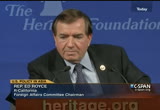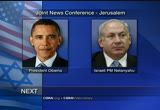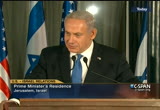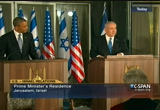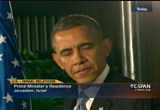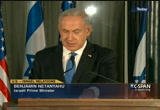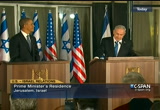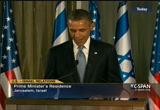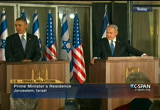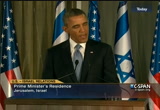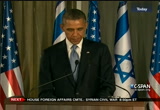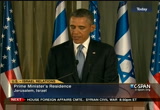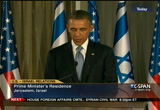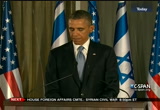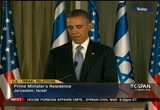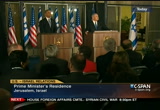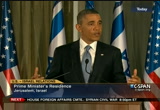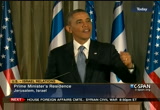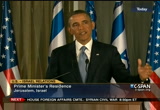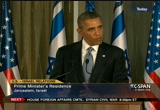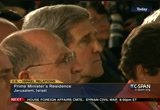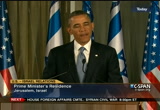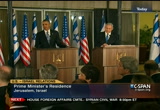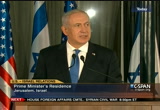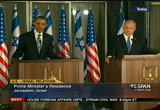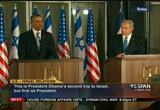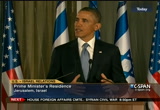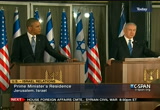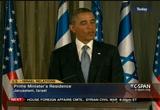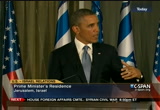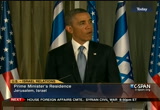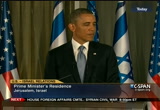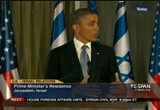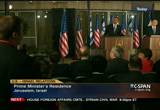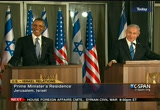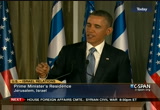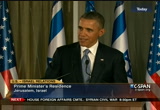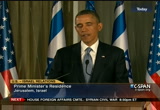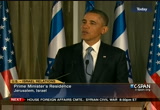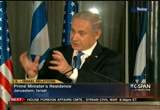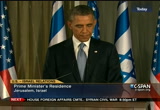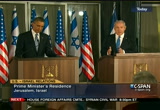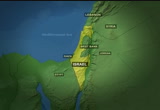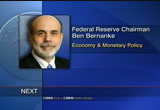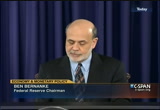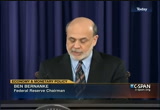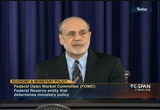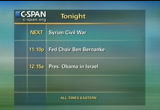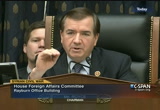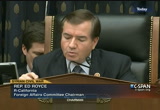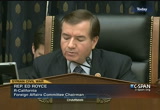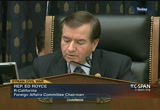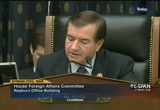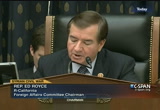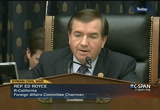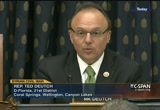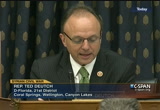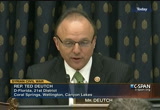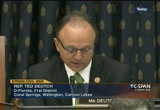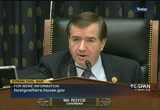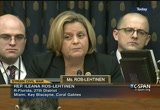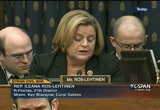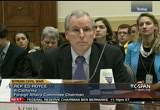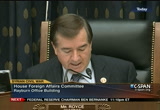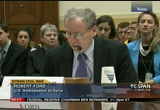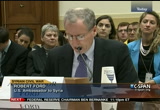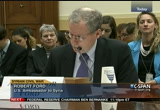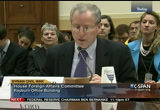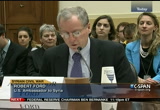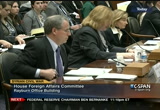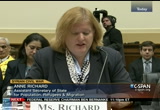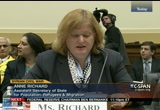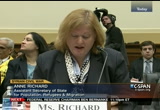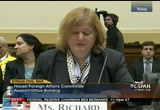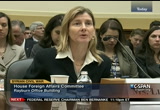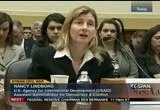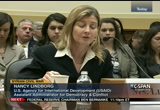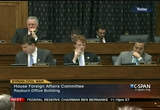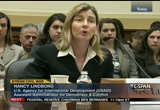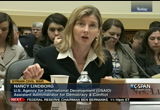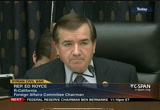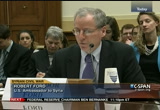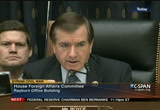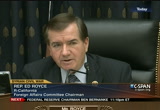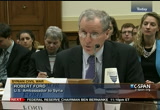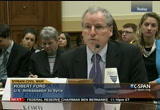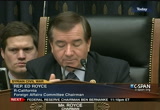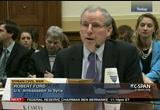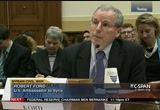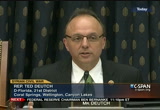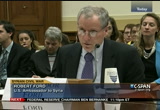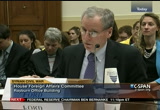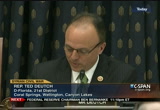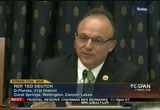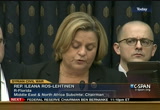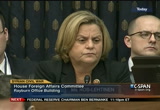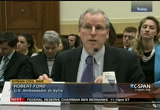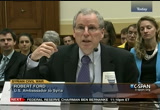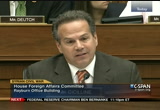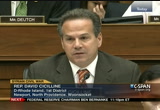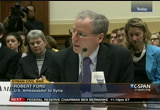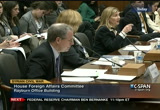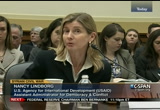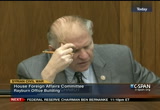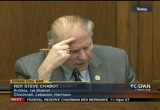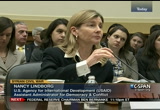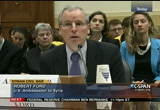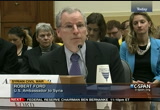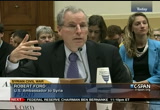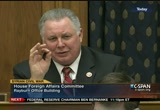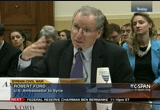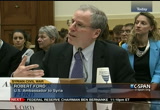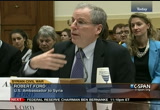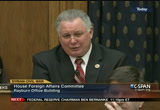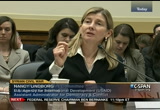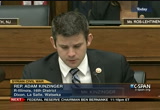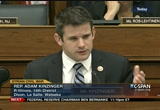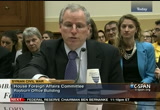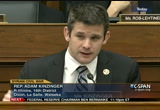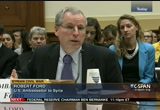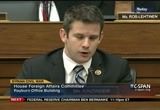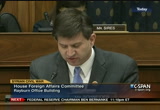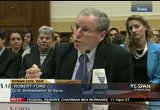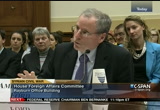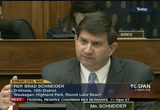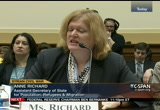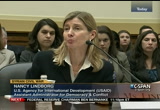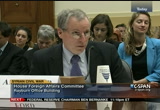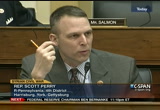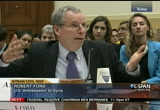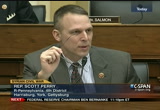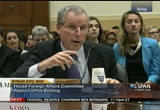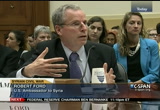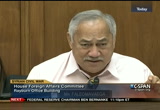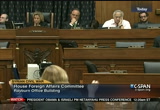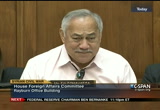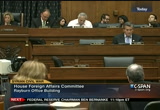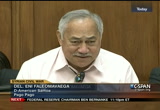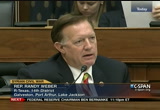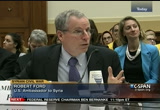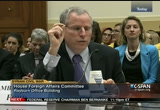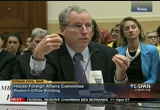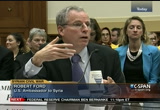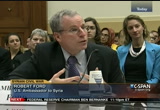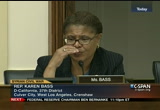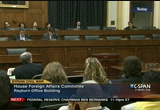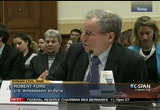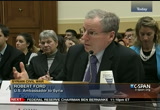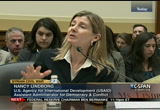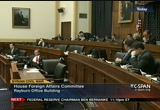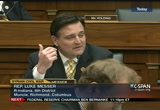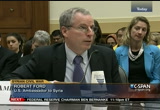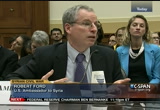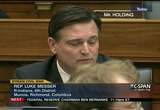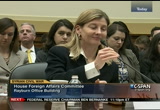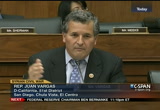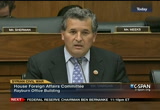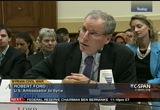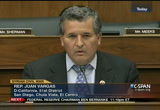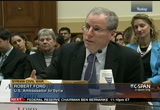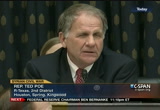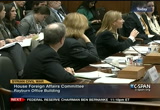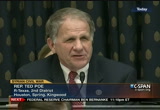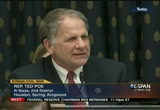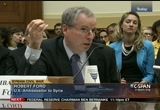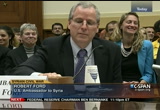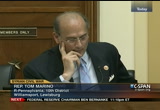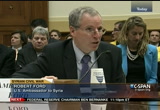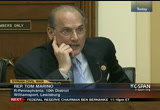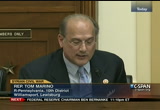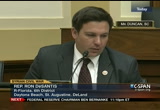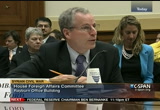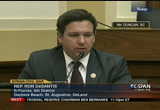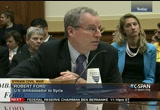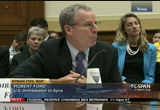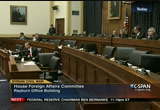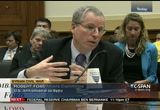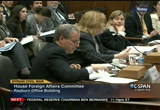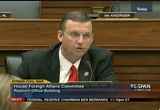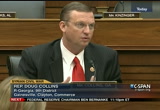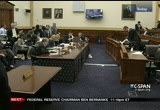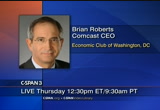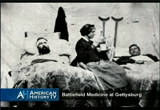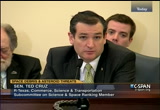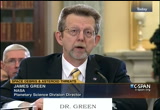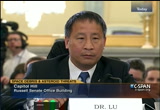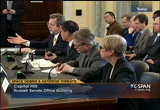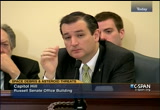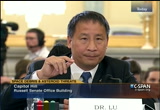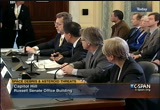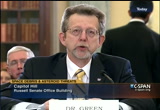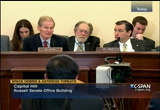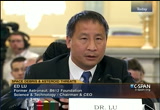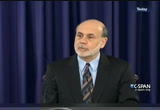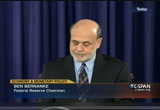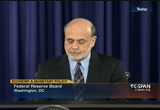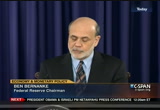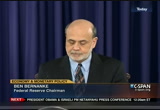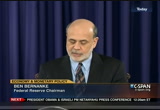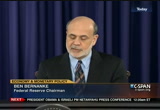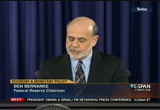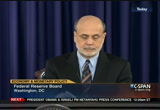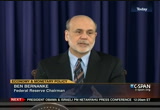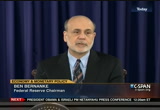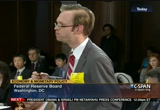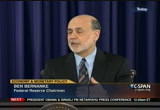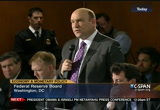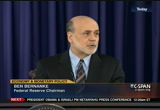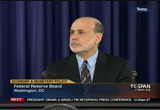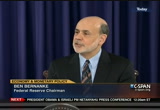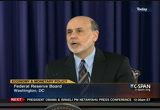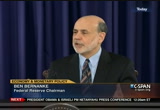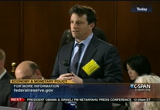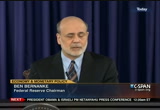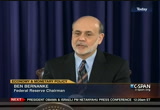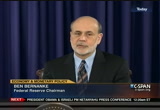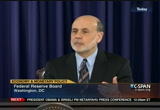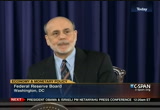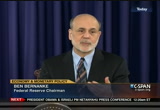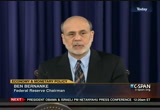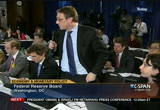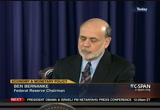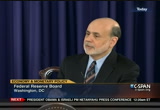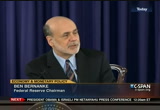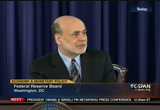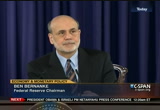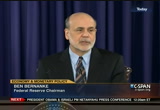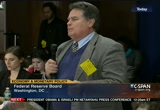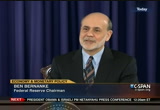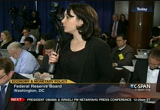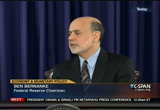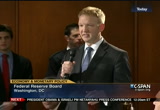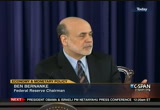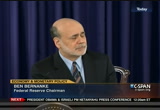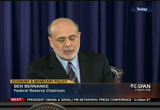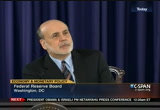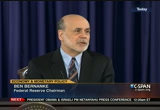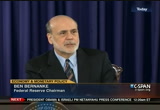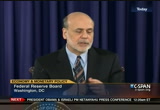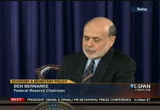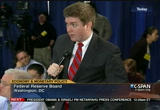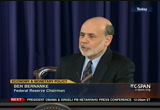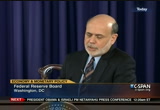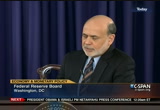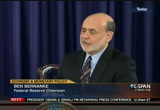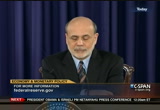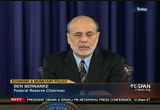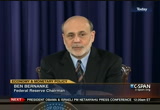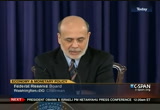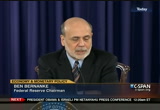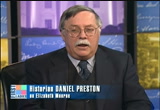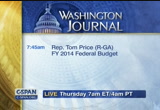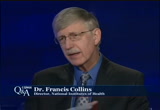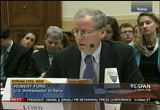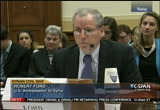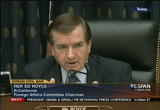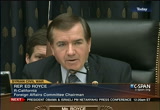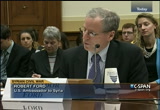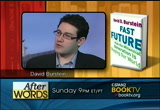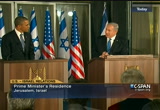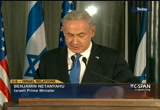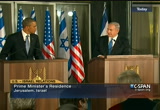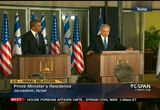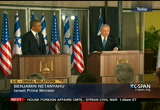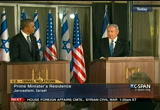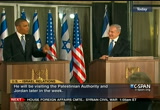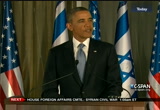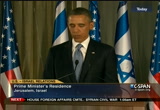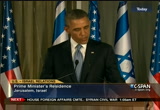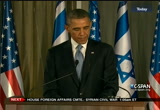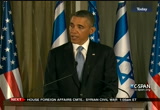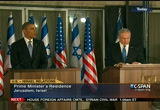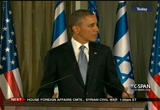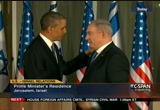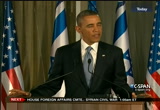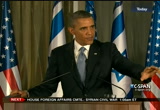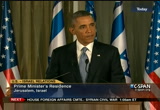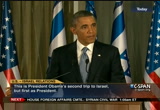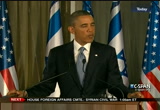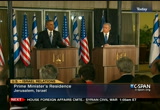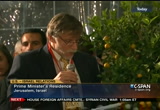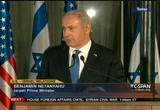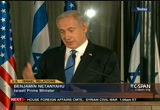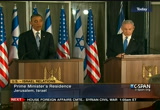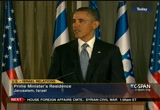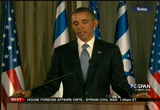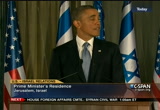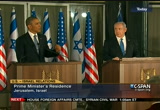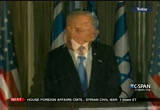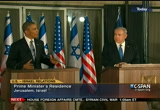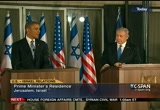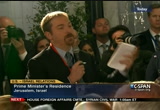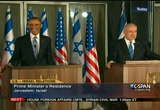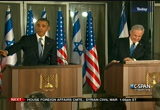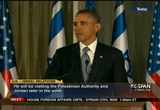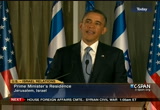tv Capitol Hill Hearings CSPAN March 20, 2013 8:00pm-1:00am EDT
8:00 pm
population lead to tremendous opportunities and also more freedom. and i think that type of dialogue is the type of dialogue that we need to engage in. thank you very much. i appreciate the opportunity. [applause] . [captions copyright national cable satellite corp. 2013] [captioning performed by national captioning institute] >> coming up a news conference with president obama and israeli prime ministers netanyahu. on thehat, discussion syrian civil war. that is followed by the fed chair ben bernanke. president obama is in israel tonight. the two leaders held a joint news conference following their meetings and answered questions on the iran nuclear program and the two state solution. this is 40 minutes.
8:01 pm
>> mr. president, it is a great pleasure to host you here in jerusalem. you have graciously hosted me many times in washington. i'm pleased to have this opportunity to reciprocate. i hope the goodwill and the warmth of the people of israel. >> very much so. >> we had an opportunity to begin discussions on a ridwide of issues. range including this is the iran pursuit of nuclear weapons. youhave made it clear that are determined to prevent iran from developing nuclear weapons. i appreciate your forthright
8:02 pm
position. i also appreciate that you have noted and have acted to thwart this threat, both through diplomacy and strong sanctions that are getting stronger yet. notwithstanding our joint efforts and your great success in mobilizing international community, diplomacy and sanctions so far have not stop their nuclear program. my view is that in order to stop the iranian nuclear program peacefully, diplomacy and sentience must be augmented with clear and credible threat of military action. in this regard, i want to say thank you once again for making clear that israel must be able to defend itself against any threat. i deeply appreciate those words. they speak to the great transformation that has occurred in the life of the
8:03 pm
jewish people with the rebirth of the jewish state. the jewish people only two animations ago were once -- ge nerations ago were once powerless against people who sought destruction. today it has both the rights and the capabilities to defend ourselves. as you said earlier today, the essence of the state of israel, the essence of the rebirth of the jewish state, a is the fulfillment of the age-old dream of the jewish people to be masters of our fate and our state. that was a wonderful line that i will cherish. it gets down to the essence of what the state is about. that is why i know you appreciate that israel can never give up our rights to defend ourselves, even for our
8:04 pm
friends. israel has no greater friend the united states of america. i look forward to working with you to address what is a threat to israel and the great writ to the peace and security of the world. the peace andat to security of the world. we share the goal of having piece from the carnage we have witnessed over the last few years. that carnage has resulted in over 70,000of people and the suffering of millions. we also share a determination to prevent the deadly arsenal of weapons within syria from falling into the hands of terrorists. i have no doubt the best way to do that is to work closely with the united states and other countries in the region to address these challenges. that is what we intend to do. , youry, mr. president visit gave us an opportunity to
8:05 pm
find a way to advance peace within israel ease and palestinians. and palestinians. i know there have been questions regarding what the policy of what a new government would be with peace toward the palestinians. let me be clear -- israel remains fully committed to peace and to the solution of a .wo state for two peoples we extend our hands in peace and friendship to the palestinian people. i hope that your visit him along with the visit of the secretary of state kerry help us turn a page in relations with the palestinians. let us sit down at the negotiating table. let us work together to achieve the historic compromise that will end our conflict once and for all. let me conclude on a personal note.
8:06 pm
i know how valuable the time and energy is of the american president, yourself. this is the 10th time we have met since you became president and since i became prime minister. you have chosen israel is your fort and then you -- venue your foreign visit and your second term. thank you for the investment you have made in our relationship and in strengthening that friendship and alliance between our two countries. it is deeply appreciated. you have come here on the eve of passover. i've always considered it it as our most cherished holiday. it celebrates the jewish passage from slavery to freedom. has alsohe ages, it inspired people struggling for freedom, including the founding fathers of the united states. it is a profound honor to host
8:07 pm
you, the leader of the free world, at this historic time in our ancient capital. mr. president, welcome to israel and jerusalem. [applause] thank you. thank you, prime minister netanyahu, for your kind words and your warm welcome. i want to express a special thanks to sarah and your two sons for their warmth and hospitality. it was wonderful to see them. i did inform the prime minister that they are very good-looking young man who clearly got there looks from their mother. [laughter] >> i could say the same of your daughters. [laughter] >> it is true. geneoal is to improve our pool by marrying women who are better than we are. minister, congratulations on
8:08 pm
the forming of your new government. we work hard to find agreement between our two parties. few legislatures can compete with the intensity, but all of this reflects the thriving nature of the israeli democracy. as he mentioned, this is our 10th meeting. we have spent more time working together than i have with any leader. the interest and the values that between and the ties our two peoples. as leaders, our responsibility is the security of our people. that is job number one. my job as president of the united states is first and foremost to keep the american people safe. as prime minister, your task is to keep the is the people of isl safe.
8:09 pm
i walked through devastated fromomes rockets. i have met children who want to live free from fear. as president, i have made it clear that the american commitment to the security of the state of israel is a solemn obligation. it is nonnegotiable. today the military and intelligence personnel cooperate work closely than ever before. joint exercises than ever before. we provide security assistance and technology to israel than ever before. that includes more support for missile defenses, like iron dome. it has saved many israeli lives.
8:10 pm
the american support for israel is unprecedented. it has never been stronger. that is a sturdy foundation we built on today as he addressed a range of shared challenges. as part of our long-term commitment to israel security, the prime minister and i agreed to extend military assistance to israel. our current agreement lasts through 2017. we have decided to extend it for years beyond. i'm pleased to announce we will assure that there is no interrupting of funding for iron dome. decisions i made last year, israel will receive approximately 200 million dollars this fiscal year. we will continue to work with congress on future funding of iron dome. these are further reminders we theirelp to preserve
8:11 pm
military edge so that israel can defend itself by itself against any threat. we also discussed a way forward for a two state solution between israel and palestine. i will be meeting with president abbas tomorrow and i'll have more to say on this topic and the speech i will deliver for that israeli people tomorrow. a lasting peace must be a and peaceful state of israel alongside a palestinian state. last year was the first in four decades when and not -- when not a single president lost its ttheir- resident lost is
8:12 pm
life. as the prime minister's new government begins her work, we continue to look for steps that both israeli's and palestinians can build trust upon which peace will depend. we read from the importance of assuring israeli security even uncertainties in the region. we support the egyptian people in their transition to democracy. we want to prevent abbas from -- with respect to syria, we work with allies and friends and the syrian opposition to haste and assad'shasten the end of
8:13 pm
rule. he has lost his lead agency -- .etters --legitimacy to rule we have been clear that the use of chemical weapons against the syrian people would be a serious and tragic mistake. we also share israel's raid concerned about the transfer of chemical or other weapons to terrorists, like has the law, -- like hezbollah, which might be used against israel. finally, we continue consultation on iran. we agree that a nuclear armed iran would be a threat to the and israel.he world we agree on our goal -- we do not have a policy of
8:14 pm
containment when it comes to a nuclear iraq. our policy is to prevent iran from obtaining a nuclear weapon. we prefer to resolve this diplomatically. there is still time to do so. must understand the need to meet their international obligations. international community will increase the pressure on the iranian government. the united states will continue to work closely with israel on steps. i will repeat -- all options are on the table. we will do what is necessary to prevent iran from getting those weapons. meeting these challenges will not be easy. it will demand is encourage and resolve that those had who preceded us. tribute to the soldiers and leaders who had laid down their lives for israel. -- of them was
8:15 pm
in a letter, he wrote, don't forget justice and resolution is on our side. that is a great deal. you and your family have served and sacrificed to defend their country. standing here today, i can say with confidence that israel' security is guaranteed because you are on their side and they have the support of the united states. [applause] >> first question. may ask you ant, practical question? ,or the last two years
8:16 pm
innocent civilians are being massacred. no one in the world has done anything to stop it. you havetical level, said today and in the past that the use of chemical weapons would be the crossing of a red line. it seems like this line was crossed yesterday. what do you intend to do about it? ini will answer the question reverse order, if you do not mind. with respect to chemical weapons, we intend to investigate thoroughly exactly what happened. obviously in syria there is a war zone. there is information that is filtered out. we have to make sure we know exactly what happened. what was the nature of the incident and what can we document and prove. i have instructed my teams to work closely with all other
8:17 pm
countries in the region and international organizations and institutions to find out precisely whether or not this red line was crossed. at this point without all the facts before me that we know the syrian government has the capacity to carry out chemical weapon attacks. inknow that there are those the syrian government who have expressed a willingness to use chemical weapons if necessary to protect themselves. of anyeply skeptical claim that it was opposition that used chemical weapons. ofrybody who knows the facts the chemical weapons stock file inside of syria as well as a
8:18 pm
serious government's capabilities i think would question those claims, but i know they are floating out there right now. is that onceoint we have established the facts, i have made clear that the use of chemical weapons is a game changer. i will not make an announcement today about the next steps he could as we need to gather the facts. because we need to gather the facts. when he started seeing weapons that can cause potential devastation and mass casualties and you let that genie out of the bottle, you are looking potentially at even more horrific scenes and you have seen in syria. the international community would act on that additional information.
8:19 pm
when it comes to issues of war and peace, having the facts before you is very important. more broadly as i said in the opening statement, the assad regime has lost credibility and legitimacy. i believe he will go. theave helped to mobilize isolation of the assad regime internationally. we have supported and recognized opposition. we have provided hundreds of millions of dollars in support for humanitarian aid. withve worked diligently other countries in the region to provide additional tools that move toward a political transition within syria. if your suggestion is that i have not acted unilaterally militarily inside of syria,
8:20 pm
would be response that to the extent possible, i want to make sure we are working as an international community to deal with this problem. it is a world problem and not a united states problem or an israel problem or a turkish problem. it is a world problem when tens of thousands of people are being slaughtered, including women and children. in anl continue to work international framework to try to bring about the kind of things that are necessary in syria. secretary kerry has been working in his current position to try to help mobilize and organize our overall efforts. everyl continue to push
8:21 pm
lever we have to try to bring about a resolution in syria that the rights and the safety and security of all regardless of whatever lines divide syria. this is not easy. when you start seeing a civil war and you have a repressive government that is intent on you haveng power, missed trust that has broken and there is an opposition that has not have the opportunity our time to both politically and militarily, then you see the devastation you have been seeing.
8:22 pm
we're doing everything we can to prevent it. i know the vast majority of international art nurse feel the same way. >> from the white house press corps. reuters. >> thank you. there were some friendly banter between the two of you on the tarmac. how much of a serious matter did that become in talks? president obama has said it will take iran at least a year to build a bomb. the is much longer than prime minister believes. mr. president, are you asking the prime minister to be more patient and hold off for at least a year on military action against iran? esther prime minister, has president obama's words convince thethat he is putting forth military that you have asked for? thank you. take a swing at this.
8:23 pm
there are so many strips of different colors on the tarmac. about that.a joke obviously this matter is no joke. it relates to our very existence and something that president identifies as a grave, strategic andat to the added states to the peace and security -- to the united states and the peace and security of the world. i'm convinced he's determined to prevent iran from obtaining nuclear weapons. i appreciate that. i also appreciate something he said, which i mentioned in the opening remarks at the jewish people have come back to their own country and be masters of their own fate. i appreciate the fact that the president has reaffirmed more than any other president
8:24 pm
israel's right and duty to defend itself by itself against any threat. we heard those important words now. .hat sums up our common view iran is a grave threat to israel and to the world. the united states is committed to deal with this. israel is committed to dealing with this. we have different vulnerabilities and capabilities. we take that into account. what we maintain is that israel has a right to independently defend itself against any threat, including the iranian threat. >> i think the only thing i would add is that our intelligence cooperation on this issue, the consultation between
8:25 pm
our militaries and intelligence is unprecedented. there is not a lot of daylight between our countries assessments in terms of where i ran is right now -- iran is right now. its ownntry has to make decisions when it comes to the awesome decision to engage in any kind of military action. israel is differently situated them the united states. i would not expect that he would make a decision about his and he forecurity that to any other country any more than the united states would be for our decision if it were affecting our national
8:26 pm
security. i think there is time to resolve this issue diplomatically. seizedanian leadership that opportunity? will they walked through that door? it would be in everybody's interest and not just israel's interest and that u.s.'s interest, but in the interest of the iranian people to be diplomatic. permanent solution to the iranian situation is ultimately going to be their decision that it is not worth it for them to pursue nuclear weapons. that, that is
8:27 pm
good for everyone. it would allow them to break out of the isolation that is their society for many years. i do not know if they would be willing to take that step. obviously their past behavior in in the words of -- or a play on words of what we cannotgan said, verify, but we need to test that this can be resolved diplomatically. , we will leave all options on the table. channel one israel. >> thank you.
8:28 pm
on your way back to washington on friday, what will you consider a successful visit question mark -- visit? convincing israeli leaders that they can rely on you? there is differences between .srael and the united states ofwill there be a reviving negotiations? hasy main goal on this trip been to have an opportunity to speak directly to the israeli people at a time when what was a pretty tough neighborhood has gotten tougher. i want them to know they have a friend in the united states. we have your back. security ofisrael's extraordinary importance to us.
8:29 pm
that just because of the bonds between our people, but because of our own national security interests. but i havetext, also sought to achieve is further consultations building on what we have discussed. there has been the forming of a new government as i am entering my second term. we continue to have close consultations around some of these interests we have discussed. is a shared concern. i want to make sure that the israeli people and government consistently understand why thinking and how i am approaching this problem. i want to understand how the israeli government and the prime minister is approaching this problem to make sure that there is no misunderstandings. peaceespect to the
8:30 pm
process, i will have more to say about this tomorrow, but i think you are right that over the , two and or two years not gonears, we have forward. we have not seen the kind of progress we would like to see. there are some elements of good news. even with all that has been happening in the region, the palestinian authority has worked effectively and cooperation with the international community in part because of the training the united states provide to do its part in maintaining security. we have seen some progress when it comes to the economic development and opportunities for the palestinian people.
8:31 pm
but the truth of the matter is, trying to bring this to some settlement, a solution that would allow to feel as if they have broken out of the current isolation that they are in this region that would allow bankrate of economic growth that is taking place inside of this country to be a model for trade and commerce and time when other countries need technology and commerce and jobs for their young people. ar palestinians to feel they as well are masters of their own fate, for
8:32 pm
to feel that the possibility of rockets raining down on the families has kind ofed, that solution we have not yet seen. is listen and do hear from prime minister netanyahu. tomorrow i will have the chance to hear from -- and get a sense from them on how they see this process moving forward. what are the possibilities and constraints constraints and how can the u.s. be helpful. i purposely did not want to come here and make some big announcement that may not match up with what the realities and possibilities on the ground are. i want to spend some time listening before i talk. my mother always taught me that was a good idea.
8:33 pm
when i go back on friday, i will be able to say to myself, i have a better understanding of what the constraints are and the interest of various parties are and how the united states can play a constructive role in bringing a lasting peace and to state living side-by-side in peace and security. >> chuck todd from nbc. >> thank you. mr. president, i want to follow up on the peace process. you began your first term with big fanfare. you talk to the muslim world. the decision to have a middle east envoy. he said he would not wait until your second term. this is the second term. what went wrong? why are we further away from a two state solution? what do you believe went wrong? do you push israel to the
8:34 pm
blowhard? what do you wish you would have done differently? do youme minister, accept the president's understanding that iran is a year away when it comes to nuclear weapons? another question -- [laughter] you said you had one question and now you have five. the young lady from channel one had one question. >> i have one for you. >> don't hog it. [laughter] my question is -- why do you believe the israeli people have not embraced president obama the same way they embraced the last
8:35 pm
two as presidents? thank you. >> you had to get in a polling question right at the end. [laughter] >> chuck, you're in court doublncorrigible. having failed to achieve peace in the middle east in my first term, i must've screwed up i hope i'm a better president now but when it first came into office. my commitment was not to achieve year ordeal in my first second year or third year. that would have been nice. what i said was that i would not wait to start on the issue until my second term. i thought it was too important. that is exactly what i did. i'm absolutely sure that there
8:36 pm
are a host of things i could've done that would have created better optics, but ultimately this is a really hard problem. it has been lingering for over six decades. the parties involved have some that youinterests over. spin or spoo smooth work a hard slog to through all of these issues. i will add that both parties have politics, just like we do back home. there are a bunch of things i would like to do back home that i did not get done in the first term. moreure i could have been -- there is well. this is hard.
8:37 pm
people disagree. it takes a confluence of both and timingatic work and serendipity. things need to fall into place at the right time and the right players feeling this is the moment to seize it. my goal is to make sure that the united states is a positive force in trying to create those opportunities as frequently as possible and to be as clear as possible as to why we think this notn important priority ly annecause of some poly and views of, why can't we all get along and by god? ?- and kumbaya
8:38 pm
i believe that palestinians will prosper and channel their energies and entrepreneurship's a more positive ways with a resolution to this issue. i will keep on making that argument. that frankly sometimes it would be easier not to make the argument and to avoid the question because it is hard. that i not the approach have tried to take. there have been times where i have made statements about what i think needs to happen and the way it gets filtered through our , it might be interpreted in ways that get israelis nervous just like there are
8:39 pm
folks back home who get nervous about areas they are not sure exactly where i stand on things. that is always why i asked to talk directly to you guys. hopefully he will show me the live film instead of the edited version. i think you had four questions answered. [laughter] >> i think there is a misunderstanding about time. decides to manufacturer a nuclear weapon, then it would take them about a year. i think that is correct. they could defer that a long time, but still get through the enrichment process, that is to make a weapon. you need two things -- enriched uranium of a critical amount and a weapon. you cannot have the weapon
8:40 pm
without the enriched uranium. you cannot have the uranium without the weapon. iran is enriching the uranium. the redot yet reached line i have described in my speech at the un. they are getting closer. the weaponturing of is a different thing. the president said correctly we , but on theseues matters and we share a common assessment. ran gets to an immunity zone when they get through the enrichment process in our view. whatever time is left, there is not a lot of time. , ity day that passes
8:41 pm
diminishes it. we do have a common assessment on the schedules and intelligence. we share intelligence. we do not have any argument about it. it is important to state that clearly. that people should get to know president obama the way that i have gotten to know. i think you heard something that is very meaningful. it might have escaped you, but it has not escaped me. the president announced that in addition to all of the aid his administration is providing, including iron dome and defense funding for israel during difficult times, he as announce that we will begin talk is on another 10 year process to ensure american military assistance to israel. this is very significant.
8:42 pm
i want to express my thanks for everything you have done. i went to thank you for the statement new made. it is very important. i think israelis will judge and by the unfolding events what is taking place. there is a very simple answer to your question, the gentleman from nbc. this is second term prim presidt and third term prime minister. [laughter] >> thank you. [applause] [captions copyright national cable satellite corp. 2013] [captioning performed by national captioning institute] obamarsday president meets with palestinian leaders before ending his trip on friday. coming up on the next "washington journal"
8:43 pm
representative tom price discusses the debate over the fiscal year 2014 budget. "washington journal" is live starting at 7 a.m. eastern on c- span. talkmocratic strategists about the future of the democratic and republican parties. you can see the advance from on c-span 2. roe went to thenrone prison. she met with lafayette and basically made her case publicly. some stories say the next day
8:44 pm
she was released. it was more like in a couple of months. it pretty much kept her from going to the guillotine and it led to her release. >> she has her own cause. she worked with the or from han asylum.rhoopp she works carla takes in her our litics in her parlics or for her husband in her own way. toyou can go to c-span.org check out "first ladies." spoke about the economy and monetary policy. you can see all of the news conference tonight a on c-span.
8:45 pm
, our policy has two main elements. first, we decided to continue purchasing mortgage-backed perrities at a pace of -- month. it bears to emphasize that the committee has described this program in terms of a monthly pace of purchases rather than a total amount of expected purchases. evolution of the program to economic criteria. within this framework, the committee can vary the pace of purchases. at this meeting, the committee judge -- second, the committee
8:46 pm
kept the target to the federal fund rate. it will remain appropriate for a considerable time after the purchase program ends and if the economic recovery strengthens. the low range for the fund rate will be appropriate as long as the unemployment rate remains above 6.5%. if economic conditions provided in the guidance are a threshold and not triggers, crossing one or more these marshaled will not automatically lead to an increase in rates. rather the committee will assess at that time whether the outlook justifies raising the target. this guidance will help market
8:47 pm
participants ss interest-rate interest ratess policy. in the individual projections, 14 of the 19 participants saw the first increase in the target for the federal fund rate as occurring in 2015 or 2016. let me comment briefly on how the two main pieces of our policy accommodations and guidance in the federal fund rate it together. the purpose of the purchases is to increase the economy's momentum and improving the market to have a sustaining recovery with priced stability to stop the rate guidance -- stability.
8:48 pm
importantly, the committee expect a considerable passed between the time that committee will cease asset purchases and a time it will be appropriate to begin removing accommodations by moving the federal fund rate target to more normal levels. committee will take a balanced approach consistent with its goals of maximum employment and inflation of 2%. in sum, the committee anticipates moderate economic growth supported by the housing sector and spending. the labor market has shown signs of improvement, but the unemployment rate remains elevated. the house foreign affairs committee examines of the u.s. to the syrian civil war. ben bernanke on monetary policy. a news conference with president
8:49 pm
obama and prime minister netanyahu. >> 70,000 people have been killed since protests began again syrian president assad. u.s. ambassador to syria, robert ford, testified at a house foreign affairs committee along with state department and usaid officials examining the u.s. response to the syrian civil war. this is two hours and 15 minutes. >> this hearing will come to order to sto. we need to review the syrian crisis. it was two years ago last week on the nightly news that we saw those protesters walking through .he street, chanting, peaceful what the world saw next without the syrian forces opened up with small arms fire on the marchers.
8:50 pm
over the ensuing weeks, that was followed by materially -- artillery barrage is and tanks and aerial apartment and finally i scud missiles into cities. two years into that syria and uprising. years, u.s. policy has been a drift. the obama administration saw assad as a reformer in the works. then at that on to play a constructive role. toand then it bet on moscow play a constructive role. this is the assad who is bombing
8:51 pm
villages in syria. this is the assad who is ordering teenagers tortured. frankly, he is engaged in murdering his populist. the ancient city is now in ruins. 70,000 syrians are dead. a million refugees has spilled into neighboring countries. destabilizing those countries. there are troubling reports that assad might be moving to unleash chemical weapons. the u.s. has been generous in supporting suffering serious, butuffering syrians, perhaps naïvely so. it has been funneled through the un and other international organizations that are restricted to areas controlled by the syrian regime. that is absurd. only recently has the u.s. begun to push food aid directly to the
8:52 pm
syrian opposition. that shift should accelerate dramatically. i really wonder about providing any humanitarian aid through the un that ends up going to the regime at all. it indirectly helps assad and therefore presumably prolongs the conflict and the human suffering. syria is a humanitarian nightmare. it is also a great, strategic challenge. at the end of the day, it might be an opportunity for reform in the society in syria. it is an opportunity for assad gone. iran would lose a key ally, when critical to its terrorist operations, including against israel. that is why iran and hezbollah
8:53 pm
are massively stepping up their support of the job -- assad regime. they provide fighters on the ground. much of this weaponry is close to iraq. that cannot continue without consequences. jihadists groupsew hottes are gaining popularity. they have convinced too syrians that they are on their side. many others are preparing for the day after his fall. n extremists are translating their battle success into authority over society as a whole, influencing schools and mosques. most of those extremists are from outside syria.
8:54 pm
many have shared with us their concerns about the influx of these foreign fighters. there are concerns with these extremists. armedid a hostile syria with chemical weapons, we need to help better organize and empower the syrian opposition. though syrians who began the revolt by chanting, peaceful, usefupeaceful. we have let them down. about it deeply prolonged engagement. the british and the french have come to realize that the biggest .inner has been assad everything should be considered, but the u.s. could have the
8:55 pm
greatest impact through training, intelligence, and logistics. it has been said the u.s. has no good options in syria. that is probably true. stay away, as he mainly had -- as we mainly have, and bad things will continue to happen. get involved and good things might happen. all of this is incredibly unpredictable. the best thing he can do is realize what we can -- we can do is realize what we can and can't do. engel has helped -- >> thank you, mr. chairman. with usu for being
8:56 pm
today. i would like to take a moment to recognize my friend who could not be here today. he is in israel. he is one of the most engaged members on this comput. the pricing is about to enter its third year. uprising is about to enter its third year. our partners are sheltering refugees0,000 respectively. the international aid has flowed to these countries in need of support. of the $1.5 billion of refugee has been to should be did. we have to do more to ensure our humanitarian aid is reaching this critical populations. we can no longer look at this as a self-contained conflict. the fighting goes on. overs isntial for spill oboe
8:57 pm
too great. there are hezbollah fighters on the ground. iranian arms flow through syria to hezbollah. iranian revolutionary guard members are on the ground in syria providing training and racing malicious in the are trampled. iranian regime is providing telecommunications equipment. the collapse of the assad regime would be a devastating blow to iran and its ability to support has below -- to support has below and other terrorist -- to support hezbollah and other terrorist groups. i will be sending a letter to the prime minister to cargo planesround attempting to access our iraqi airspace. for the sake of regional stability, we and our partners
8:58 pm
must cooperate with urgency to bring this conflict to an end. the obvious question remains, what more should or can we do? says providing direct humanitarian aid is a positive step. the syrian people need to know that they have this the support of the united states. the european allies led by france and great britain are provideing ways to legal assistance to the opposition. the argument for arming the opposition will shift the balance of power. what are the chances of a success if we do not provide assistance? when assad falls and it is only a question of when, we need to ensure that our own security interest will be protected.
8:59 pm
this means a promise many new government that any powerful weapon will be secured and destroyed. it is our response ability to determine whether this can be arms will notres fall into terrorist organizations. i'm encouraged the syrian opposition chose the prime minister for exile yesterday. time is of the essence. there are difficult decisions that must be made in the days and weeks ahead. continue to push for un security council resolution. do we provide military advisers and training? do we provide direct military
9:00 pm
assistance? if so, what kind? can aside be pushed to accept any to go she dated conflict -- negotiated comput? -- conflict? makes this more pressing. the use of chemical weapons by this regime would be horrific. 70,000 slaughtered syrians is terrific. the discussions we have in this committee are interesting. the fact that this is hard cannot stop us from acting. you and your colleagues know better than anyone there are no easy answers. inaction is not an option. i look forward to your testimony and i yield back. thank you. >> thank you. three minutes to the chairman of the middle east subcommittee. >> thank you so much for holding this timely hearing as the a to debt -- two-year anniversary
9:01 pm
just passed. as the years of violence and internal struggles, the fighting continues and direction -- and the refugee crisis spreads the stability of the region. refugees,1 million the numbers continue to rise and there is no clear end in sight. to the streets and ed, and this has turned too a full scale conflict seek to establish an islamic state in the wake of assad's removal. the the movement has been coopted by extremists. that is why the united states must take with extreme caution any action that deals with opposition forces in syria. i respect the opinion of my
9:02 pm
colleague but i do not believe it is time for the u.s. to arm the rebels. too many questions remain about who the rebels are and with whom they will swear allegiance. the unknown can be dangerous and the vatican -- the vetting of the operation is not enough when we played can be used against our allies or even the united states in a post-assad era. assaconcerned about an stopd pile of wmd's. examine all the regimes that continue to help him stay afloat. last week, the director of testifiedntelligence associated materials for several countries, including iran and destruction of a
9:03 pm
nuclear reaction in 2011 -- 2007, illustrates this. to address this national security threat, congressman brad and i introduce the non- proliferation accountability act. this bipartisan bill prohibits assistance to any government that has provided assistance to iran, north korea, or syria. we welcome co-sponsors to our legislation. thank you so much. ambassador robert is the american ambassador to syria. he has served to an masser of algeria.
9:04 pm
ms. wreck -- ms. richard serves for the bureau of population refugees and prior to her appointment, she worked for the international rescue committee, a committee committed to refugees and internally displaced persons. the assistant administrator for the bureau of .he conflict she was president of mercy corps. objection, the witness's a full testimony, your full statements will be made part of the record. have five days to submit statements or record. i ask you to summarize your testimony within those five minutes.
9:05 pm
[captioning performed by national captioning institute] [captions copyright national cable satellite corp. 2013] >> good morning. thank you very much for inviting me to come talk with you today. i know our time is limited. i will keep my remarks brief. peacefulted out as a demand for dignity and freedom has turned instead to a devastating conflict with a horrific human toll. syrians face a new level of ruthlessness which is raining missiles down on neighborhoods, bombing hospitals and schools and sending out its thugs into streets to terrorize and the rest of fellow citizens. more than 70,000 syrians have died since the beginning of the conflict. number is rising, -- that number is rising.
9:06 pm
1 million syrians have left their homes in their country to seek refuge in neighboring countries, and number which could quadruple by the end of this year. it is very striking that jordan's fourth largest city now is a refugee camp. we are working to alleviate the human suffering. the united states is the largest bilateral human aid donor and my colleagues can tell you more about our humanitarian assistance effort. let me talk instead about how this can end. beyond addressing humanitarian needs, the united states is acting. the united states is helping syrians who seek a government that will respect the dignity and the rights of all syrians and that will foster, not grant,
9:07 pm
stability in the middle east. stability in the middle east. partners -- international partners have recognized the coalition as the legitimate representative of the syrian people. the coalition has a diverse group of representatives inside and outside of syria. the coalition is committed to a democratic and inclusive government, free from the influence of violent extremists. now, it needs help providing basic services in liberated areas. secretary. behalf announced -- secretary kerry in rome s, ounced to help the syrian
9:08 pm
and to provide food and medical supplies to the supreme military command of the free syrian army and to the syrian opposition council for those in need. our aid is very important, thecially in to solve complete collapse of state institutions, the point which the secretary has ever fought -- and emphasized repeatedly. ,e perceive that a negotiated political transition is the best long-term solution to the syrian crisis. the geneva communique, agreed upon by the united nations security council, turkey, calls for a transition government body to be set up with full executive powers formed on the basis of mutual consent. between the opposition and the
9:09 pm
syrian regime. assad and hishow lost theirslong ago legitimacy, weir cannot see how he and his circle could play a role in that governing body. he must set -- step aside. thated to establish transitioning governing body. it is not easy. how are we to get there? noted, weretary has need to change assad's calculations because he still thinks he can win militarily. therefore, we are working with our partners to strengthen the opposition and to change the balance on the ground to help give the opposition the leverage toy need to negotiate and
9:10 pm
change his calculations. let me know here that the election as prime minister for the coalition has set -- has stepped forward. we look forward to working with them in the west -- with him in the weeks ahead. withok forward to working the congress as we seek to support the needs of the syrian people in their struggle to create a free, stable, and democratic state -- syria. thank you. >> good morning chairman, ranking members, and members of this committee. thank you for hosting this today. i am pleased to be able to appear before the committee with my colleagues. our offices work closely
9:11 pm
together to provide humanitarian aid to those affected by the violence in syria. the two-year anniversary coincides with another milestone. refugees have fled syria. half of that number arrived in the last two months. abbott like to share with you the approach taken to address the crisis and how it it.lements and reinforces intocribe -- i will not go the details here. i invite questions from you on a very different situations we have seen in jordan, lebanon, turkey, and iraq. we recognize the huge strain the influx of refugees is placing on host countries. it is essential those countries continue to keep their borders open. in every meeting with officials from these countries, we thank them for allowing refugees to
9:12 pm
be -- to come across. the bureau worked closely with our colleagues. together, we lead the u.s. government's humanitarian response. we have traveled often to the region. on our most recent trips, we were and -- we were joined by ambassador ford in turkey. the state department is helping to get as much humanitarian aid as possible. we are providing funding to the united nations and non- governmental organizations. these agencies bring technical expertise and operational capacity to respond to a crisis as large scale as this. the contribution totaled nearly $185 million.
9:13 pm
the basic humanitarian needs, both inside syria and in host countries. delivery of it -- delivery of assistance is taken often at great personal risk. aid has been delivered in syria where thousands are in need of health. such movements are highly dangerous. people in need are not concentrated in one area. they can be found all around the shifting battle lines. that same organization is provided in a neutral manner. the united nations is seeking to get access to all communities in need on a regular basis. it is unacceptable and a violation of humanitarian principles for the syrian regime to deny this access. five that -- 525,000 palestinian
9:14 pm
refugees were living in syria prior to the start of the conflict. they have been caught in the violence and syria. fighting has engulfed many palestinian refugee camps and neighborhoods, including yarmouk, causing over half of syria's palestinian population to be displaced. for the most part, the palestinian population is get away from taking sides in this conflict. i have got my work cut out for me. i encourage the leaders to take on more risk and pushed beyond a requesting a plan
9:15 pm
for every conceivable contingency. we are asking they work with us to ensure international aid and help us uphold international standards -- international standards. in conclusion, my bureau's primary concern of the detection aiding those who have fled the violence. and returning peace to syria and vote -- and when they see the refugees return home. i am -- i would be happy to answer your questions.
9:17 pm
>> chairman royce, members of the committee, thank you for inviting me to speak with you today . i appreciate the opportunity to talk with you about the u.s . response to syria's crisis to date . thank you also for your continued support for our assistance programs around the world, which are making a positive difference every day in millions of lives around the world . we have just passed the two-year anniversary since the onset of the syrian conflict . sadly, the country continues to face a grim situation and an escalating humanitarian crisis. the dreams of those who first began with hopeful demonstrations on the street of damascus are far from being realized . the statistics are numbing: more than 70,000 dead; more than 4 million people inside the country in need of assistance; and more than 2.5 million displaced from their homes . we have already reached the somber milestone of more than one million refugees in neighboring countries, with greater numbers of refugees fleeing the violence each day . the united states is fully committed to standing with and supporting the syrian people . i traveled to turkey and jordan with ambassador ford and assistant secretary richard in late january to underscore that message of support . i met with young activists who have been yanked from their dreams of college, braved arrest and in some cases served brutal jail time, and who are now dedicated to organizing their generation for a better future . several of them sent me text messages on march 8th as part of
9:18 pm
their "i am she" campaign, urging people to wear white on international women's day in honor of the many syrian women who have suffered violence during this conflict . and we met with refugees who have fled bombardment and attack . one man and his three young sons all had fresh shrapnel wounds as we talked in the camp in jordan . and in a tragic twist of technology, more than one woman showed me photos on her cell phones of dead children or lost husbands . i will highlight today several of the ways in which the united states is providing assistance, including support for the democratic transition, help for the neighboring countries reeling under the influx of refugees, and urgently needed humanitarian help, as well as underscore the magnitude of the challenge ahead . the united states is investing in the future of a democratic, prosperous syria and has committed nearly $115 million in non-lethal assistance to support syria's opposition coalition (soc), its assistance coordination unit (acu), and emergent democratic institutions at the grassroots level . we are working from the ground up by supporting the efforts of the local councils and civil society groups and from the top down by helping the soc build its capacity to administer opposition-held areas and provide urgent and essential services to the people of syria . newly 2 announced program commitments will support the soc/acu's ability to manage and implement donor funds both to meet urgent needs and for strategic initiatives that support rehabilitation and restoration of basic services for the syrian people . we know from prior transitions the importance of providing basic services and meeting the fundamental needs of a community from fuel to schools to trash collection . in conflict and post-conflict environments, this is especially vital as communities need reason to believe in the possibility of a better future and establish trust in opposition leadership . at usaid we are working quickly through usaid's office of transition initiatives to provide the soc with support to respond rapidly to immediate requests from local councils -- including the provision of emergency power, clean water, heaters, and educational supplies for children in strategically selected areas -- as well as support strategic transition initiatives that restore basic services . as ambassador ford has detailed, $54 million in non-lethal assistance, of the $115 million committed, is already at work through state and usaid- supported mechanisms to support, train, equip, and connect a
9:19 pm
network of civil society activists, civilian opposition leaders, and emergent democratic institutions . usaid has prioritized help for syrian women to play a meaningful role in the country's transition through training and support for coalition-building . working with the state department, usaid recently co- sponsored a workshop for syrian women that resulted in the development of a formal syrian women's network and the drafting of a charter for syrian women . we fully recognize the toll of this conflict on the neighboring countries that have so generously taken in the thousands of refugees that flee each day . assistant secretary richard has noted the extensive efforts underway to support syrian refugees . we are working as well through our usaid missions to help alleviate the potential tensions and impact of a growing syrian refugee burden on host communities and stressed country systems . in lebanon, syrian refugees now comprise more than 10 percent of the population, comparable to more than 22 million refugees suddenly coming to the united states . we have shifted existing programming to focus on mitigating conflict in particularly affected, vulnerable lebanese communities, primarily in the north and the bekaa valley . programs are focused on reducing strains on resources by improving service delivery and expanding economic and education opportunities . we are working to support lebanon's leaders in their efforts to bridge sectarian and ethnic divides, with a particular focus on youth to encourage their participation in resolving community concerns . in jordan, the united states has responded vigorously to support the government of jordan (goj) as it copes with the influx of 350,000 syrian refugees to-date, as well as help the jordanian people who are hosting syrian refugees in their communities . we have used the complex crisis fund to help mitigate potential conflict in northern jordanian communities where water supplies, never abundant, are stretched thin by arriving refugees . the usaid mission has realigned existing projects and cash transfer assistance ($284 million in fy 2012) to cover gaps in the goj budget that are, in part, due to increased costs related to the arrival of the syrian refugees . finally and most urgently, the united states has fully mobilized to provide humanitarian assistance in syria . we have provided nearly $385 million in humanitarian aid to date, $215 million of which is helping those in need in all governorates inside syria . our aid is reaching all 14
9:20 pm
governorates in syria, and an estimated 60 percent is working to help those in contested and opposition-held areas . and i want to be clear: our funding is not just a pledge; every dollar counted is already at work on the ground every day, in some of the worst violence- affected areas, including idlib, aleppo, and dar'a . we are working through all channels to enable our assistance to reach people throughout syria: the united nations (un), international organizations, non-governmental organizations, and local syrian organizations and networks and thousands of dedicated aid workers and syrians who risk their lives daily . we have prioritized the provision of food aid, basic medical care, trauma care, and relief supplies . working through partners, including a cadre of very brave syrian physicians, we are supporting a life line of essential medical supplies and drugs, trauma training for doctors and support for hospitals and mobile clinics . this assistance is saving lives every day . right now in syria, the united states is providing support for 144 hospitals, health clinics, and mobile medical units . this includes providing medical supplies and equipment, paying doctors' salaries, and training additional first responders and medical staff . usaid-supported field hospitals are providing emergency care and emotional support for children, women and men who have suffered sexual- and gender-based violence . the hours and days following rape are critical to treat injuries related to the assault, prevent infection, and receive the basic emotional support that will allow survivors to recover and resume a full life . the u.s . is the largest donor for emergency food assistance for those affected by conflict in syria, including those who have fled to neighboring countries . world food program (wfp) activities supported by the united states currently provide monthly rations to nearly 1.5 million within syria and approximately 300,000 refugees in jordan, lebanon, turkey, iraq and egypt . wfp targets for these programs are set to increase in coming months to 2.5 million people inside syria and 755,000 in neighboring countries . in aleppo governorate, the u.s . is providing enough flour to more than 50 bakeries to provide daily bread for 210,000 people . some of these bakeries had been shuttered for nearly three weeks before this program began, and they are now able to operate . syrian families in these areas have bread, and the bakery owners and workers are once again earning income . throughout the winter, we pushed
9:21 pm
hard to ensure warm blankets, winter clothes, plastic sheeting and mattresses for over one million internally displaced syrians who had fled their homes, many of whom have been displaced two or three times already . now, as winter becomes spring, we face a new set of warm weather challenges, and we will shift greater focus to providing clean 4 water, improving sanitation and stepping up hygiene supplies and education to thwart the onset of waterborne disease . as makeshift camps have sprung up along the turkish border, such as the olive tree camp in atmeh, near the reyhanli border crossing in turkey's hatay province, we are responding with assistance to improve basic personal hygieneincluding hygiene kits for each familyalso essential to preventing disease . at olive tree, u.s . assistance has also established 120 garbage collection points and trash removal services, repaired the water pump, established water trucking, installed pipe for a sewage system, and constructed 140 latrines . after the brutality they have suffered and witnessed, children and adults alike need psychosocial support to help them through this crisis . from helping to form women's groups that encourage discussion to providing vital psychosocial support for children by providing a safe space for them to play and interact with their peers, we are helping to provide ways for syrians to work through the trauma . with u.s . government support, unicef continues to provide psychosocial support to more than 32,000 children in damascus, rif damascus, homs, and aleppo governorates, including in conflict locations . in 2013, unicef aims to reach 300,000 children throughout the country . in complex crises, coordination with international partners is imperative to ensure the greatest effectiveness of humanitarian contributions . the un-led coordination effort for syria enables the humanitarian community to collectively identify and meet immediate humanitarian needs without duplication . meanwhile, the soc's acu has assumed a vital role in coordinating efforts to reach syrians, especially in opposition-held and contested areas . the un, uk and usaid each have full time liaisons in turkey to work with the acu, which holds a weekly coordination meeting with all donors and implementing partners to share information and map out delivery of assistance to priority areas . thanks to the determination of acu leadership, it has grown quickly since its inception in november, and we continue to help the acu build its capacity
9:22 pm
to coordinate and leverage international assistance inside syria . key challenges despite our efforts, syria's humanitarian crisis is quickly outpacing current international response capacity . as violence escalates, three critical challenges are impeding the international humanitarian system from more effectively meeting the urgent needs of the syrian people . first, access remains greatly constrained, especially to the seven northern governorates . in late january, the un had a breakthrough in delivering assistance across battle lines and has since completed three cross line missions . these efforts are making a tangible differencebut these cross-line operations are logistically complicated and dangerous, underscoring the need for direct, cross-border delivery . this is essential if we are going to be able to reach those in need more quickly . >> thank you. he said, and increasingly beleaguered regime might be prepared to use chemical weapons against the syrian people. doubtd know many of us the syrian government would risk foreign interference but the point camel weapons. there are reports yesterday of chemical weapons used, as you have seen. i was going to ask you what you could tell us on that. >> so far, we have no evidence to substantiate the reports that chemical weapons were used yesterday. i want to underline we are looking very carefully at these reports. we are consulting with partners in the region and in the international community. more broadly, we have been very clear from the beginning about our concern that, as the assad regime's military situation deteriorates, and it becomes ever more beleaguered, that it might be tempted to use chemical weapons. the president has been cleared
9:23 pm
makes theg if assad mistake of using chemical weapons or if they fail to meet their obligations to secure them, there will be consequences and they will be held accountable. >> what would those consequences be? >> in a hearing like this, i absolutely do not want to go into hypothetical. i do want to underline that we take these reports and possibilities very seriously. and we are using all of our available means to determine exactly what happened. >> you raise another point. that is to the transfer of other weapons going through iraq, by airspace or by land, and to syria last week, we had a report that the regime was
9:24 pm
to theing assistance assad regime. the observation is this is the lifeline, not just the foreign fighters, but the ammunitions being flown in. it is being utilized throughout civilian aircraft, personnel are flying in through airspace, as well as the weapons. we see that and we see at the same time hezbollah on the ground now in syria. this has been raised several times for the government in iraq. the government there is wrapping this up. up.amping this if we really grasped the
9:25 pm
strategic opportunity here, it seems like one of the easiest things we could do would be to and get thisraqis process halted. hass going to ask how hard the administration weighed in with the iraqis, what has been tried to get them to cease and desist, and how congress -- how might congress help make the job clearer and easier for the administration, if that is what is necessary. >> thank you for that. a couple of things i would like to note. the iranian relationship to the regime is not new. as you noted, the assistance to the regime now in this conflict has grown substantially. example, the for iranian revolutionary court lost
9:26 pm
a general in syria. they have lost other personnel, as well. i do not want to fail to mention lebanese hezbollah is planning a pernicious role. there are supports we are seeing now of iraqi shia extremists going to places like the neighborhood of damascus. this is a serious problem. it is prolonging the conflict. we have raised on multiple occasions the officials. i have done so myself when i visited baghdad in the end of last year. we had an official in washington. very recently, two weeks ago. during bit -- visits here in washington. pressing the
9:27 pm
iraqis. we want the government to inerstand it has no interest having an extremist government in syria. the longer the conflict continues, the greater the influence of extremists on the ground. iraq should be working with us to get that negotiated settlement i talked about. >> it seems to me with our capacity to put pressure on other governments, with respect bring change in syria, we are certainly missing an opportunity, given that the flow of these fighters are over iraqi territory and they are not assisting. we are missing the opportunity a directof conversation about the securities assistance we have provided and the means whereby
9:28 pm
tocould, frankly, force iraq at least be part of the solution rather than part of the problem here. of anythingou think definitive that has been shared with the iraqis on that front? >> let me assure you we have had very direct conversations with iraqis. i, myself, have. our ambassador in baghdad has. washington,re in the white house, the state department. there is a senior official here from baghdad a week before last. we have been very direct with not about the importance of allowing iran to exploit the crisis in syria and it is not helpful to iraqi interests, as
9:29 pm
well as the region's interests. >> thank you. >> i will follow up with questions. you have pressed the iraqis, you have been directed them. is transfer of iranian arms a suspect to embargo. here,is so much at stake if you could -- what specific leverage might the united states employed in those direct discussions that are taking place with the iraqis? >> i do not want to go into great detail here about our discussions with iraqis. we have discussed the united states resolution with the iraqis. in a sense, in the end, what matters is the government of iraq understand that its own
9:30 pm
interests will be best served not by facilitating the iranian efforts to prolong the crisis in syria, but rather in bringing about a transitional government that will have good relations with the government in iraq. understanding by the iraqi government would be helpful. action by the iraqi government would be necessary to ensure this takes place. i would like to focus on two types of aid. one is military. there is a difference of opinion here on capitol hill. about whether or not provide direct military assistance to the opposition. the argument is made that it is really hard to know where these weapons are going, that they might wind up in the wrong hands. that, as we assess this, it is
9:31 pm
too difficult for us to be able to decide how to get this into the right group's hands. do you agree with that? doesact that it is hard, 70,000 dead syrians, does that make it easier for us to assess the possibility of doing this? first, let me say all of us working on the syrian issue are incredibly saddened by the human toll in syria. i was there and i visited the people. they were peaceful and what happened to them is atrocious and what happened to other syrians is atrocious. direct military assaults -- assistance, our policy is not to provide military assistance to the
9:32 pm
supreme military council. we regularly reviewed this. be clear about that. our policy is not to provide such assistance. effort inused in our both sides of the importance of a political solution and getting them to that negotiated political deal. step intaken a major terms of our relations with the supreme military commander by for the first time providing food and medical assistance to it to those in syria in need. we are not providing direct military -- >> i understand and i am not suggesting immediate change. i am suggesting this is an important conversation for us to have and it needs to take place right now.
9:33 pm
i am asking if you agree it is too difficult for us to identify who should receive those arms if the policy were to change? >> as we review whether or not to provide direct military assistance, we do it within the context of trying to decide if it would help us get to the political settlement that we think is the only way to get to the long term park -- long-term crisis. the question you asked is not the only question we take into consideration. >> i appreciate that. what you described at the end of your testimony, you commented it is a wonderful opportunity to give your message. i hope in all the discussions
9:34 pm
that take place here about whether or not to provide military assistance and working with the opposition and doing all of the things we need to to ultimately push assad out that there is a very clear understanding about the work that you and the agency does every single day, the work you do every day, to address this humanitarian crisis and, most importantly, your efforts to make sure the syrian people understand that even as we have all these other discussions, the united states of america is committed to working to address this humanitarian crisis in a very serious and very concerted way. sincereo pass on my thanks and i hope you get the attention that is deserved, perhaps as the result of this hearing. >> thank you. thank you to all of the panelists.
9:35 pm
i wanted to ask three questions, first on the rebels, who are these guys? the countries that are aiding passat -- assad. on the rebels' lack of cohesive structure and they continue to expand their operations, but to what end? you believe there is greater cohesion in the opposition forces and, if so, will that fix? some syrian rebels have been designated as foreign terrorist organizations. they have captured u.n. peacekeepers after being released later. the u.s. must take necessary precautions and due diligence. can you give us more information about the opposition? they are not just syrian national.
9:36 pm
who are far and fighters have the islamic militants from neighboring countries. post-asidevern in a syria? on weapons of mass destruction, are reports correct the syrian regime might possess up to 50 tons of weapons-grade nuclear materials in its stockpile? true, willports are the u.s. call for an emergency meeting to discuss this and if assad does not grant inspectors immediate access to all nuclear facilities and stockpiles so they can be protected, will the u.s. impose and mediate, comprehensive, and painful sanctions? will we do sell acting with the european union? lastly, on the countries that are aiding the brutality of regime, these countries
9:37 pm
continue to provide military assistance, weaponry, and they seek to further the illegal weapons program in supporting these foreign terrorist organizations. what can we do to hold these regimes accountable for supplying the syrian regime with armed helicopters, military equipment, during the human rights crisis. in light of russia's policy in syria, i believe the obama administration's string of concessions to moscow must stop. i wanted to hear your thoughts on the rebels, and what will we do with countries that are helping syria? >> with respect to the rebels and who they are, i divide them into two categories.
9:38 pm
there is political opposition and military opposition. both are not entirely unified, although, on the political side, that shows the prime minister yesterday, they are more and more unified. they have representatives from inside and outside the country. on the armed opposition side, they have established a supreme military command headed by a man whom i have met several times. he has said to us and others that he will respect a political deal worked out by the political opposition. he does not perceive that the threat -- the free syrian army should have a political role in the future of syria. to be very frank, that is one of
9:39 pm
the reasons we decided to provide direct food and medical assistance to his command to help him within the context of the broader syrian opposition to iraq's let me also add, with respect to your question on weapons of mass destruction, even when i went out as ambassador several years ago, this is a huge issue. it has become even more of a concern, given our worries about the regime and its desperate military situation using chemical weapons. we continue to talk regularly to the international atomic energy agency in vienna. that theue to urge syrian regime be completely transparent about what it has been doing with respect to its nuclear program. with respect to access, we have
9:40 pm
long wanted that. we argued for it consistently. with the fighting in the area now, we would have to find out if it would want to go. >> you can address that at another time, the other question. thank you for the time. thank you, ambassador. >> thank you. we will go to david. >> thank you. thank you for convening this important hearing. thank you to the witnesses for their testimony. two questions. secretary carey has said the policy of the united states is to change aside = = assad's -- assad's calculations. i would like your assessment as to whether or not there is any evidence he has begun to change his calculation in that direction and whether or not there is a set of individuals the opposition might be prepared to negotiate with and whether the geneva framework makes any sense or if there is any
9:41 pm
prospect for its -- for resolution. i want to also thank you for the are you and your agency doing. thank you for your testimony. i am particularly interested if you would share with us some of the work being done to protect syrian women and girls. there have been reports from a recent u.n. report about the devastating consequences of the conflict on women and the rape of syrian women who are fleeing syria to countries where they are not finding better conditions and incidences of rape and forced marriage and child marriages and the like. if you could share with us some of the work being done to protect cyrian girls and women, i would be grateful. >> with respect to changing a
9:42 pm
sought's calculations, i am not a psychiatrist. statements where he said he would never leave syria. maybe he is tearing -- telling the truth. i do not know. we also know the military balance is turning against the regime. they lost the capital at the end of february. captured the regime's governor and other officials. they have lost control of the border along turkey and iraq. fighting now in damascus. we have been getting messages from the syrians that there was heavy fighting right up close to where the president lives. it certainly would have been rattling his windows. tol he then decide negotiate and to save himself? politicalnegotiated deal as the best means to get a
9:43 pm
sustainable, new government that has to be agreed upon by the different sides to the conflict. that does not mean we will ask the supreme military command to implement a cease-fire. we would like to see negotiations. hass struck the regime offered to rescind a delegation, but i do not know if that is serious. the genevao discuss framework for a transition has noent in which assad part. >> thank you very much for your question. i would start by saying when i was there in january, it was with a group of young activists, including young women who had to give up their dreams of being lawyers and finish their college
9:44 pm
education. i got a serious -- a series of tax messages from them to promote a campaign to organize that we supported, very much focused on bringing attention to special needs of women in conflict. we take this seriously globally. in a rapeso brought kits and counselors. it is important after a sexual assault to get treatment. we are working with partners to provide special counseling for the many children who are affected by this who are traumatized now. this has impact for the rest of your life to go through this. many children are being caught in the crossfire. it is brutal. want to say might something about the particular plight of women in refugee camps. with groups inng
9:45 pm
jordan and turkey to ensure that aid is provided to women -- and girls who have suffered and fled syria. we have heard very credible reports that one of the things they are fleeing from israel. we arerefugee camp, --ing fund in refunding funding. >> there was an article which appeared in the national review recently. it was entitled, the silent exodus of serious christians. it started out 2 million or so. to some degree, it is similar to was a war taking
9:46 pm
place there and christians were targeted, murder, kidnapped, raped, all kinds of a horrific things happening. there has been a relationship between the regime and some of the christian community, as well. that clearly exists and it is a complicating factor. they are a particular threat is a particular threat from islamic groups. what has the administration been doing about it. what should we be doing? one quote in the article is that the ethanol religious cleansing taking place could soon see syrians -- syria and emptied of christians. getting tremendous coverage in the media.
9:47 pm
>> thank you. i think this underscores the fragmentation happening in syria and the ways in which so many particular groups are being targeted and friend. we provide humanitarian assistance on the basis of need, regardless of who you are. allre seeking to get into the 14 governments, and many of the christian communities are concentrated in the christian valley. we are ensuring the assistance is getting their through our partners, as well as in a few pockets of the suburbs. this is something we are watching, along with all the groups that are vulnerable. either one of the other witnesses want to touch on this? and that's it? >> a couple of things i would
9:48 pm
like to emphasize. i was in iraq for almost five years. i saw what happened to the christian community there. was terrible. they are still often under threat. i am very sensitive to that. the administration is very sensitive to that. a couple of things i want to highlight. we are deeply concerned about the threat of islamic extremists within the syrian opposition. that is why the administration in decemberhe front 2012 as an affiliate of the al qaeda organization in iraq. we did that specifically to warn others in the syrian opposition of the risks they take by working with the front. i am encouraged that there have been instances now where other syrians who want a tolerant society, other syrians who believe all syrians should be treated equally without respect
9:49 pm
to their religion or ethnicity, are starting to push back in some instances. there is a great deal of concern. i want to assure you, i mentioned i have met people from the pre syrian army, and we have highlighted the worries of minority groups and christians, not that we are against the sunni majority of syria. we are not. the minorities are nervous and there might -- their rights must be protected and respected. we hear good things from them. i can tell you for example that they have met christian leaders from some of the communities in syria and have told us afterwards that their meetings were populated. we have to keep pushing in that direction. >> thank you. if you could touch on the chemical weapons issues. was called a red line and there
9:50 pm
have been reports as recently in the last 24 hours about what is actually happening on the ground, whether they have been used, whether they will be used. if you could just talk about what the administration is doing to prevent the transfer of these .eapons to groups thank you. issue withd this extreme seriousness. it is incredibly important to us. we approach it on several fronts. right now, we are trying to verify reports we have seen recently about the use. there are reports of being used in the north and the domestic -- damascus suburbs. we are trying to verify those reports. we are talking to our partners about what they have been able
9:51 pm
to find out. in addition, we have had regular countriess with other who have influence with the the regime toe not use these weapons and instead maintain tight control over them. warning theree would be consequences and there would be accountability for those members of the regime that would ever think of using these things. >> thank you. now --ill go >> i listen and read all the comments regarding syria. i always read about these keywords that we want to negotiate. we want to talk. we want a political solution. we want dialogue as the best way to go. my concern is that this man is a
9:52 pm
criminal now. for what he has done to his people. if you come to a solution where there is dialogue, where somehow he says, let's talk, somewhere along the line, he have to be held responsible for what he has done to his people. i hope in this dialogue and conversation and those keywords i read all the time on of these articles, that somewhere along the line, and he is held responsible for the criminal acts he has done to its people. -- to his people. >> several things on that. we do not say a dialogue because this is not about having a conversation between the opposition and the receipt -- and the regime. this is about negotiating. >> is the same thing. >> they matter here because we
9:53 pm
are talking about him stepping down and setting up a new transition governing body. with respect to accountability, we have said he should be held accountable and that members of his regime, with buckets of blood on their hands, also should be held accountable. we are actually helping train syrian investigators to prepare dossiers. .his is on going the bureau is undertaking this act -- along with the ambassador, for war crimes. we are training syrian investigators so they can prepare associates to be used in meetings. the syrians themselves have to decide by what mechanism they hold people accountable.
9:54 pm
we are anxious to provide them the capabilities to pursue people in this way. >> thank you. can you talk a little bit about the role in russia? i know they are supportive and i know yesterday the ambassador about the rebels. can you talk a little bit about the usual coyness? congressman, we saw the russian statement that the syrian army yesterday used chemical weapons. we have no evidence to corroborate that and we are very skeptical of it. we will look at it. our initial impression is we are very skeptical. with respect to the russian position, they say they are not attached to assad. genevagned up to the framework i have talked about.
9:55 pm
however, we would like us to go far beyond that. we would like to stop delivering arms systems to the syrian government. this is an ongoing conversation we have had with them. we would also like the russians to join the rest of the international community in the very tight economic sanctions regime, which we have developed with the countries in the middle east and the japanese and other countries. we would welcome the countries joining that, all with the goal of getting to a sustainable political solution. >> can you talk about the issue of branding a little bit? it seems we can put our name on some of the food or whatever material we delivered to syria. how would they know we are the ones assisting them?
9:56 pm
>> i am happy to share a little bit. i encourage the assessment minister to talk about -- the assistant administrator to talk about this. we understand the utility of syrians seeing $385 million in american distance going in to help syrians in need. we are the largest off bilateral donor. --re are something nancy, do you want to say more? >> we look every opportunity where we can ran safely. are able to save lives in this difficult crisis.
9:57 pm
if we do so in a way that further endangers the aid workers, it threatens not only our very brave colleagues, but it also will shut down the overall enterprise. it is a delicate balance. we are also looking at all the other ways to get the word out. all the other ways to communicate directly to the syrian people that the american people are standing with them. >> thank you. thank you all for coming and being here. mr. ambassador, i understand you are not the president but you have probably been in conversations i have not. one of the reasons this hearing is so important is i can't take you on a journey right now. i want to ask you to go on that journey with. that is trying to figure out what our foreign policy is. i have had a very hard time doing that. i am stumped on the answer in syria. i do not know what the answer is. we have waited so long to to really do anything.
9:58 pm
2009 inds me of iran in and we saw an opportunity against the regime. i find ourselves in a situation now where i do feel like we are reacting to this situation and if we go back to the beginning of the conflict and the net -- and the initial uprising of ssad, you have the iran receive supporting the syrian regime on the one hand, and syrian fighter -- freedom fighters on the other hand. at that time, you could assume extremism would not have the ability to organize to this -- to the great extent they probably organize now. at the beginning, and i am asking yolks because you're at -- asking you because you were at these compositions, against a regime that is a supported obama
9:59 pm
-- supported by iran? i will keep it short because there is a lot i want to ask. >> to be very brief, congressman, i, personally, do not agree we waited so long. we were helping democracy activists when i'd was in syria in 2011. we were doing a lot to help them. >> what was the reason to hold legal aid at that point? >> a lot of people in syria did not want outside interference in their uprising, the revolution. for a long time. through 2011. the syrians themselves wanted their demonstrations to be peaceful. they did not want foreign armed intervention. they were bitterly criticizing iran for their intervention. >> i am talking about when it came to a shooting war. i am trying to figure this out because i do not know the answer. this is a difficult quandary.
10:00 pm
let me ask another question. when we talk about the red line and the use of chemical weapons, i know this has been hammered, especially by the chairman, we will find out what happened. it is a matter of time if we whether they had chemical weapons. a red line is supposed to be a red line, a point you do not cross. the president said, if you use chemical weapons, that is a red line. now i hear there's a shifting redlined really are -- we are talking about the transfer of nuclear weapons. it seems like a yellow line. my mind of a red line is to make it very clear. if you use chemical weapons against people, we will devastae your ability to use chemical weapons. the result of that will be 8 feet thinking about whether you will use chemical weapons theinst your own people --
10:01 pm
results of that will be a deep thinking about whether you will use chemical weapons against your own people. is russia frightened of our involvement with syria or are they happy with our situation right now and the approach we're taking? >> congressman, i am not a spokesman for the russian or iranian foreign ministry. reactionsnture of the -- the very nature of the iranian reactions suggest they are nervous. hey are pluffing up their people on the ground and what they are sending in. that does not sound like a confident stance to me. they should be nervous. i mentioned how the military balance has shifted strongly. >> is it a nervousness because of the situation on the ground or because of what we are doing? are we helping that nervousness?
10:02 pm
>> absolutely. let me give you an example. a lot of this war is being fought on video. much of the equipment that provides the youtube videos that we see comes from us. we are the ones helping the opposition both get information from the outside world through the internet and also to offload stuff back to the rest of planet earth -- and also to upload stuff back to the rest of the planet earth. we have worked very closely with the provincial resolution council to make sure they can stay in a turkish. >> thank you. -- make sure they can stay in touch. >> thank you. >> i hope this is not an extension of what was made famous of the lead behind its strategy. but american retreat from the world, i think chaos ensues --
10:03 pm
when america retreats from the world, i think chaos ensues. >> thank you. thank you to the witnesses for joining us here today. d, as he stated, our goals are to see the assad regime leave as soon as possible, retaining syrian national unity and an emergence of a new syrian government that enhances security. as we look at that and are developing our strategy, what events might be indication that our desire and stated objectives are not achievable and if we see those, what are alternatives if national unity is not achievable? worry about the collapse
10:04 pm
of the state. i cannot mean the government of bashar al-assad. we think he will go in any case but collapse of state institutions. we have seen that in other places and we do not want to see the syrian government does appear to read the institutions of state -- we have seen that in other places and we do not want to see government disappear. institutions of state, where we further, thatding would be a sign that things are going worse. extremists. increasing we are our assistance to these areas that have been liberated from government control and where state institutions are failing. we are directly helping local
10:05 pm
councils which have been set up by the syrian revolution. we will work very closely with the prime minister to funnel assistance into these local councils so they can prevent the full collapse of state institutions. that is our biggest concern in terms of maintaining unity in keeping syria from being an operating base for terrorist extremists helping maintain security. , if unity is not achievable what is our best alternative? congressman, i think today, we can get to a solution that maintains the unity of syria. the different groups in syria represented in this coalition i talked about all want to unity.in syria's
10:06 pm
even the foot soldiers of bashar al-assad's list army are not calling for the division of the country. i cannot think syrians are looking to divide their state. -- i do not think circassians are looking to divide their state. it could be that the government will look entirely different from how the last government did. i can imagine lots of political scenarios where you can work out a deal between the groups >> taking in more regionally, we , ve refugees in turkey overwhelming in jordan and lebanon on. term, this becomes a financial burden of political risk to these countries. what do we need to make sure we
10:07 pm
do everything necessary so that does not happen? conversations with these neighboring countries -- they have explained to us the strains and burdens this is putting on their societies. there are economic strains and also attentions between the groups in those countries like in lebanon, for example. we talked about questions and i thought about how christians and muslims live together in lebanon on but when you have these extra burdens put on the country, and provoked tensions among different communities. what congress can do is continue to provide assistance so we can support these countries. in some cases such as dorgan, we have a bilateral assistance relationship -- such as jordan, we have a bilateral assistance
10:08 pm
relationship. even in turkey we can do discrete things by providing assistance through non- governmental organizations are having technical experts provide assistance even though the turks lead of much in the their own camps. i realize that asking for more money at this current time in this environment on capitol hill kind of goes against the grain but that is the key way that we can convert our good aid andons to real, live make a difference in people's lives on the ground. testimony are some of the ways we are rushing to help communities who are strained by the influx of refugees, and working with the governments of both these countries to provide additional support. question, onetant we are deeply focused on. thank you, mr. chairman and
10:09 pm
folks on the panel for your attendance. ford, i am wondering regarding the redline, i want some specifics -- what are the , and ie consequences share your current skepticism, what are the range of possible consequences the american people can expect from the administration as a response? congressman, i really do not want to speculate here about hypothetical situations. what i do want to underline that the president has said there will be consequences and that we will seek strongly that the people who use chemical weapons be held accountable.
10:10 pm
exactly what those consequences would do today, i cannot -- >> have consequences been discussed that you know of? >> i am very certain that they .ave do want to underline how seriously we take the reports. >> i appreciate that. but i think it is important for the world and congress and americans to know what we can expect to see so we can have that discussion because if it happens, it will be very quick and we do not want to be in a position of monday morning quarterbacking after the fact to make sure we got it right. i understand your reluctance.
10:11 pm
i am not talking about hypothetical situations. we have to have a plan and we what those plans and possibilities are. with any, do we know certainty what kind of wmd's, whether it is choking agents, what are we talking about? has theyrian government largest stock of chemical weapons and in the country in the region and it includes the things he mentioned. state withcannot yet certainty that chemical weapons have been used in the last days, i cannot tell you what happened. i can tell you that we have a large team of people working on its right now. and i understand your concerns
10:12 pm
about explaining to the american people but first we need to understand what exactly has happened, if anything. >> right now we're looking at the anniversary of iraq and a lot of folks are questioning, what has happened there and why did we do that and what did we get out of it? we don't want to e4nd up -- to end up there again and we should learn from those mistakes. e don't want the current administration to make the mistakes of in the past administrations. with that and your characterization of the stockpiles syria has, i think the american people and the world see two outcomes. assad has little impetus to do anything but stay there. if he leaves willingly, he will be tried for war crimes and spent his life in prison. accomplihat's a fait
10:13 pm
at this point. what safeguards are in place regarding cross border material transportation of the things we discussed? we understand the risk you are talking about. in terms of leakage of materials, which is why we have underlined two of the syrian authorities that these materials have to stay in in their sight and have to stay secure. >> let me clarify -- the syrian authorities you are talking about are the ones currently in power? >> correct. but i would also say i have met the general and we have told him that we would view their using these kinds of weapons as
10:14 pm
completely unacceptable. what cigars -- what safeguards have you discussed regarding border control of these agents other than telling the current regime do not do anything with them. what are we doing proactively to make sure they do not end up a in the wrong hands? , wehe neighboring states have different kinds of bilateral programs with iraq, .ith jordan, lebanon certainly with turkey. we have a regular conversation on the question of the syrian chemical weapons stocks and what is to be done about it. what i can tell you here is bet we are looking to
10:15 pm
helpful with them to address those risks and each government is taking differing responses according to its differing needs. >> thank you very much, ambassador. mr. faleomavaega. >> thank you. i just wanted to ask secretary richard with your understanding what is e issues, happening -- do you see a similar pattern in what took place in rwanda in terms of the crisis? do you consider syria, we are going through the same situation we found ourselves dealing with rwanda and darfur? >> the difference between syria and rwanda as that rwanda was carried out by large numbers of
10:16 pm
people using very simple instruments and they set upon their neighbors and the slaughter them over a quick period of time. in syria, we see months and months that people are being killed by their own government, from the sky. the refugees we talked to in jordan were talking about a barrel bombs. exy would come down, plode, and take out large groups of people. then also as robert discussedasscuds -- as robert used tod, scuds being destroy a city blocks.
10:17 pm
the results are the same. lots of innocent lives lost in a senseless way. >> our current policy, there is no military assistance to be given to the syrian opposition forces but it is ok for russia and iran and even north korea to continue to supply the assad things theyh the needed so he can continue killing his own people. you see a contradiction here in terms of us being an observer of all this and the killing continues because countries like -- and by thean way, iraq allows iran their sapce to transfer so-called
10:18 pm
medical supply and i am told it is all military hardware that needs. can you help us figure this out? >> congressman, our policy is not to get military assistance. however, it is not factually right to say the united states thinks it is ok for other countries to provide assistance to the outside regime. i did say that we have urged the russians not to send military regime.t to the assad we have asked the russians to join us and the rest of the international community in putting pressure on the assad regime. we have been at the forefront of countries denouncing iranian behavior in syria. the united states first started talking about it publicly. the same with north korea. we have had sanctions in place
10:19 pm
on iran and north korea as well as on the syrian regime precisely because of this kind of behavior which we find destabilizing, not only in syria, but to the broader middle east region. >> the question on the chemical and biological weapons -- i'm thataccording to reports the syrian officials had given every assurance that the stockpile of chemical weapons are fully secured under the supervision of the military, will never be used unless syria faces external aggression. i am sure you are familiar with that. does that sound like an invitation from the assad regime? does that seem to be the danger we face ourselves with? >> we have studied this remarks
10:20 pm
very carefully. exactly what concerns us. at the military balance schists steadily against the regime and gross more desperate, they will and end up using them themself. that is why we take the reports the last couple of days very seriously and you're trying to determine what happened. >> thank you. mr. weber is recognized. >> thank you, madam chairman. ambassador, would you outline whether it is hezbollah, al qaeda, the external forces working in syria to overthrow their kind of in order of
10:21 pm
strength in your opinion. then let's outlined what you looking assad syria like. who ends up with the most power after he leaves? >> congressman, there are a variety of external actors now in the syria crisis. are tryingome that to get rid of them like the al qaeda affiliate. we think the are a minority within the armed opposition, maybe 15%. >> who is the no. 1 external influence? al qaeda >> marks against the regime, yes. there are other countries also involved in the fight against assad's regime but what concerns
10:22 pm
us are the extremists and at the top of that list -- >> enumerate the extremists. >> there are a number of groups. >> how strong are they? >> smaller but their strength varies location to location. in a lot of these are localized groups. what is interesting is it has a national command and it is more dangers that way. >> of the employed of those groups on a post-assad government? -- the influence of those groups on a post-assad government? an hey did not allow
10:23 pm
extremist group to join the military command. we think they will resist the influence of those groups after assad departs. inentioned already that syria we see some places where groups have tried to impose religious courts and generated negative reaction near aleppo and down in damascus. we have seen places where they have tried to impose imam in mosques, replacing them with corners -- them with foreigners. >what i think is important is that in this revolution, there are two competing visions of a future syria. one is an islamic extremist
10:24 pm
vision supported by this al qaeda affiliate's and others and there is a vision promoted that would be a tolerant syria which respects the rights of all serious equally. we want to weigh in strongly on behalf of those who advocate that second vision. >> that goes without saying. what is the chance that will happen? up innot want them to end anti-american hands. secretary kerry during his visit to the middle east recently highlighted that we are thatasingly confident countries that are providing soistance can do so in ways arms to not get in the hands of extremists. this is something we talked to them daley about. know that?ad
10:25 pm
what absolutely. -- >> absolutely. i think today he is back yet decided his days are numbered and that he will have to leave. >> what advice would you give us to expedite that decision? >> i hope congress will work with us to strengthen the syrian opposition. i hope congress will support our efforts. we need all the pressure we can get on the iraqis to get them to see whether long-term interests are best balance. -- are best bound. support of show a tolerant society. >> ticket. -- thank you. on awant to follow up
10:26 pm
couple points the ambassador was making. , is to be helpful by helping to strengthen the syrian opposition and that is where i wanted to center my questions. you described two centers of power -- the military and as interim prime minister who i guess was voted in yesterday with 35 votes out of 63 members of the coalition. power --e centers of with these centers of power, i want you to elaborate a little more. i'm concerned who this is we would be charming. some of these folks are from assad's military who defected. correct me if i am wrong.
10:27 pm
what do you think of the military subordinating itself to military leadership? but thank you, congresswoman. -- you, congresswoman. i understand the concerns about arming. with respect to the political ide, we think -- let me say something about the prime minister this elected. and gaveppily in texas up work there to work on behalf organizens and to help humanitarian assistance efforts.
10:28 pm
turkey worked in with him there. he is a capable manager. >> isn't that karzai's background >? ? wasn't he happily in texas, too? > in the end the syrian opposition said it transitional government would have to be established. whether or not he has a role in that is not determined. we view this as a short-term step to help provide services assistancetarian into areas of syria liberated from regime control. that is how he defines his role. he spoke yesterday to the press in turkey about that.
10:29 pm
term prospects politically, i cannot speak to. i do not think that is what they are thinking about now. they have much more urgent problems with respect to the outflow of refugees into the neighboring countries and the dire circumstances of syrians inside syria >> greater thanyou >> you mentioned what we were concerned about was the collapse of the state. hasn't the state collapsed? does it have any legitimacy? >> i make a distinction between legitimacy and the collapse. muchal damascus is very under government control. where theeas government's control has receded in the north and east, their has stoppedrge part
10:30 pm
working. iraq were huge problems in can years ago. >> thank you. lindborg fornk ms. all the workers usaid does. you mentioned the rape kit and sacks of salt. what is the capacity to deal with that? kit.ou mentioned the rape what the capacity to deal with that? >> is limited but it is important that through the provision of those supplies, even regular supplies that women experiencedhose who violence, it is limited but it is part of how we train those who are participating in the clinics and hospitals we support. you are a web of a champion of
10:31 pm
women, i want to make another comment. part of supporting this tolerance secular vision is also supporting the strong syrian women to have a voice and be a part of that future. along with our state colleague, we are providing support and training for a group of women who put together a charter for certain women. this is part of a long-term commitment to be at the table during negotiations and to be part of the future. >> thank you very much. orga ltzer is >> coming from indiana, you can
10:32 pm
judge people by their actions and by their friends. he has acomes to assad, lot of the wrong friends and when you look at the actions with the murder of 70,000 people ,n the displacement of millions odyssey the action there are terrible. challenge we face as policymakers been looking at the opposition in judging their , some real challenges as and would ask you to folks we would like to see. i mean this with great respect as policy-makers try to figure
10:33 pm
out how we make a shot at what can we do to try to help those who would be closer to the kind of government we would like to see assad postsee. like to see post assad. theet me tell you about head of the syrian opposition coalition. the gentlemant they elected yesterday. let me talk about the president of the opposition coalition. he is an imam from the largest mosque and in damascus. i have met him many times. i think what most impressed me about him was after we designated the front as a terrorist affiliate of the al qaeda and iraq group, there was a lot of criticism inside syria.
10:34 pm
that is not a secret. they came right out and said the kind of ideologies that he they even imposing a special tax on questions which have not been done in the middle east in hundreds of years, these things are rejected, he said. he talked about reaching out to the backbone of assad's remaining support. fightd join us, did not us, and we are not fighting you. an open letter was written to the syrian christian community. i know it does have a big impact. respect forision of the dignity of all syrians, a
10:35 pm
vision of tolerance, coexistence. i think the vast majority assyrians really want to believe a debt of that vision. the extremist we talked about thea minority but at violence goes on, those extremist voices are getting louder. the remaining time i have left, thank you for the humanitarian work you're doing. obviously it is very important. expand, youd mentioned the efforts we are making to make sure those being held there recognizable america has played in providing that .elp if you could just detail that a little bit i would appreciate it. on the caseamining by case basis when and where we
10:36 pm
might be able to safely brand. we are looking at the ways in which people get their information. andook a trip to the region intensive regional media arabic- using things like twitter, skype, podcasting into syria. it really has a full long campaign of all the ways we can let the syrian people know that the american people are with them in their time of need. this hearing is a good opportunity as well so thank you. we went to the studio part of the state department yesterday and spoke to the lead correspondent from syria and a
10:37 pm
group of journalists try to get information into syria. we arehat all the time trying to get messages out all -- however we can. >> thank you. mr. vargas is recognized. >> thank you for the opportunity. when i was young, i was always disgusted when i saw one of these dictators go into exile. i always thought that was unfair that it would take someone who had done all these atrocities and allow them usually to go to france. in ahink of him living series life with his family. it seems like we have changed those lost. older however,n i wonder about the thought process of someone like bashar al-assad. i wonder what he is thinking.
10:38 pm
looking into the egypt in the former president there in prison and potentially going to be executed. he is going to think it's time to call it quits and go. now we have gotten so tough on these people. we do not allow them to exile. we try to hunt them down, put them in jail and do all these things to them. if you can get into his head, what is the thought process head? on in his this would be better if i give up or do you think roll the tanks? >> i am not a psychiatrist. i have met bashar al-assad twice
10:39 pm
but i would not understand -- i would not say i understand his psychology. i think today he still thinks he russia, with help from iran, but i think he must also understand his windows are rattled because the fighting is getting closer. he must be thinking about whether his calculations are correct. we think that syrians will have to decide how to hold him and his ruthless circle accountable. it is ultimately a decision for syrians to make. what we have saw to do -- sought help them develop the core facilities to take packages to international standards.
10:40 pm
you're helping a center which we france, to dons, rance, to d that. >> how realistic is that if you are a dictator and he became the dictator because their father died. your father was a ruthless persondoruthless you thin. do you think he will kill people, as many as he can, and -- i think this is one of the issues we have to re-think. is it really worth the murder of , mostly children, or do you let one really
10:41 pm
horrible human being potentially escape? i do not know. maybe they had it right for centuries before we had are more strict dictate. i put it out there because i thought this was probably what mubarak was going to do it also. did.his guy of course i don't know where else would he go. go ahead. >> two things i would say on this. first, i do not know where he would go either if he decided to flee. there would be a lot of countries that would not take him because of the awful things he is responsible for. but he also has a family, young children, a wife. what will happen to them? i do notin the end,
10:42 pm
think these are decisions americans have to make. these are decisions syrians will have to make because they will have to live with the results. we have tried to give them options, to give the capability to deploy if they decide to follow a particular option. i am proud we have given those options and i know they appreciate it. >> thank you very much. >> thank you all for being here. turkey, sawly in the dust battery's down on the border with syria and went to a refugee camp where 150,000 syrians are in turkey. i was impressed with the way the turks are handling the thousands of people they have and they're taking care of. i talked to some of the folks from syria, including the women,
10:43 pm
and got the impression that the persecution of women specifically is not confined to forces.al-assad's it is anybody, criminal from foreign countries, revolutionaries, bad guys, and which mayment indicate to me that there are a lot of bad things happening to the civilian population by the people involved in the military conflict. miss lindborg, is that what you understand or you think it is confined to government forces alone? >> thank you for taking the trip. is an important symbol to have the visit. you are write. this goes far beyond. one beyond
10:44 pm
it ishan anything else, emblematic of the global epidemic of violence against women. we see this goes far beyond the borders of syria. valentine's day, there was an event called a billion rising which is women around the globe with taking to the streets with music and poetry but making that assertion that there is the longer it placed on this planet for violence against women. we are working in all the ways we can to address the symptoms to provide treatment, counseling, medical care. at the end of the day, there are deep norms that need to be changed around the world. >> i appreciate your work on that. if i had my way, we would take all those criminals and give them a child together and put women on the . and let them decide. mr. ambassador, i want to come
10:45 pm
i haven't called a lot of things but a diplomat is not one of them. i met assad. i did not like him when i met him. i don't like him now. is the scenario playing out that assad will retreat his regime around damascus and maybe seed the area outside damascus then hold his ground? can we see a smaller s yria, a smaller assad regime? do you see that happening? is that his plan? >> can i add one point to the
10:46 pm
women. this is important. in of the congressional modification, the way we intend to use our system money, we will spend approximately $5 million to help the syrian opposition coalition and the local council the talked-about in liberated areas to develop their police inces because law and order turkey is a big issue. get the police -- >> excuse me, i only have a minute left to >> there are two possibilities. atl he hold out in damascus the end? maybe. a lot nikki might retreat to the heartland -- a lot think he might be to the hardeart land. aim my time, i'mm
10:47 pm
sorry. the leading opposition movement, as that an al qaeda affiliate? >> no. the al qaeda affiliate is a small part of the opposition, is small minority. but his voice is getting louder. minister, new prime what is his affiliation with the moslem brotherhood? what is your opinion? >> i met him twice and he struck me as more texan than moslem brotherhood, frankly. [laughter] >> you not think he is affiliated with the muslim brotherhood? >> i do not know what his political affiliations are but i know he also has a tolerant of vision of syrian society.
10:48 pm
at some self sacrificed and gone over to help with the humanitarian crisis in syria. he did not have to do that. >> thank you. texan. him at he's a >> thank you. ambassador, you can leave your microphone on. i saw on the news today -- i , thetwo m aiain concerns innocent people in syria and our good friends, israel. i saw the president getting off the plane and meeting the president and prime minister. it reminded me of my daughter's first prom date, bringing him to the house to meet me. it was a tense situation. be that as it may, what are the
10:49 pm
chances hezbollah will remain a potent force in syria and if that is the case, will their role in libya the affected - be affected? wants tok hezbollah remain a potent force in syria, there is no question of that. they are increasing their presence now. when i talk to serious across the serious-- when i talk to syrians across the spectrum, the anger at what hezbollah has done to help the regime is palpable. the transition government, when it comes, is not going to want a relationship at all with regimeah like the assad had. >> what is the status of arms
10:50 pm
transferred to hezbollah today? into details here in an open session on the intelligence but what i can say is that arms continue to reach hezbollah from iran. actionsalso hezbollah's in syria and suggest to me that hezbollah is very nervous about it willace in syria and have an impact on their >> position.greater tha old smith fall of -- the ultimate fall of andd affect iran, hezbollah hamas? >> it will present us with big
10:51 pm
strategic opportunities to stabilize that part of the middle east. iran's losing access to lebanon through syria will help lebanon on. in addition, losing the -- addition, laws in the alliance will make it harder for iran to spread its influence to terrorist groups that have worked with syria and iran. for us, it would be a strategic gain. >> ms. richards, i see you have andten many articles opinion pieces on combating terrorism. what can we continue to do or do with more strength to address the issues of terrorism, relationship with syria? how do we curtailed as presently since -- curtail this
10:52 pm
is still since assad in control? >> i am not qualified to enter your question. i yield back my time. thank you. >> now we will go to mr. desantis. chairman,ou, madam aned witnesses. i do not believe assad should survive. that is an easy thing for me to say. i did not think he ever had any legitimacy to begin with. i agree with thomas paine on the ascendancy of these hereditary dictatorships. species paine said any of character to the same
10:53 pm
authority. north korea with year-old kid, 25- now in charge of these weapons. do you have any idea to what extent these are her former eign ers -- are forien fighters? >> the group that concerns us most was her study by two hottest -- were started by jihadists. international of support are they getting? do they have any other source of
10:54 pm
support or? >> they do. that's one of the things that enables them to attract a lot of recruits. i think a lot assyrians to fight under the banner are not extremists -- i think a lot of syrians who fight under their banner are not extremists. they have a well-developed network of private finance that moves up to them and they are able to access. >> if it gets to the point where somebody else take over in syria, somebody like iran, how with immediate between some of these groups -- how would they mediate between some of these groups? would they be willing to work with a group like jn or some of
10:55 pm
these moderate syrian opposition groups? i'm trying to figure out how this would affect iran's role in the region. >> the groups we are talking about hate iran passionately. i would be concerned they would at theand kill syrians end the fighting. that is a different concern. >> what about the moderate groups? such as the supreme military council also are going already- they are frustrated with iran and angry at the iranian interventionists. i don't think they are going to have a good relationship at all with iran after this crisis comes to a close and we have a
10:56 pm
transition government. have seems like when you different groups potentially combining for power, it seems like the most militant and uppernt tend to take the hand in because they are willing to do what ever. i'm worried that will happen in this case. do you think that is a legitimate fear and what can be toe from our perspective shape the outcome in a way that will be better for peace in the region? >> that is exactly our concern. my experience in other countries such as algeria and iraq, as the violence grows, extremists profit from that. standinghe grand appeals.' we think it is important to
10:57 pm
empower people to have a more tolerant of vision of what syrian society should be. we need to target as best we can we source close to buy into these jihad is groups -- jihadists groups. we have to find ways to help liberatedian groups from government control to provide basic services which will on the correct -- which will undercut a lot of the appeal these extremists have. >> thank you. i yield back. >> thank you. mr. collins of georgia is recognized. >> ambassador ford, the neesd to solidify the efforts of syrian syrian ompeting --
10:58 pm
competing, what are we providing so much support through un agencies that rely on the consent of assad for their access? they are able to claim credit for providing services to their civilians. assad seet not be how s that? >> i am making a huge distinction between helping councils of the liberated areas provide basic services, getting chlorine so public water can be not theback on, that is
10:59 pm
kind of humanitarian assistance provided to people in need in a government controlled areas. the programs we are talking $60ut, this is the million secretary carey kerry ed -- secretary announced. strengthen liberated areas and help knit and national liberation. transfers or is that done directly? >> we do that directly. that has nothing to do with the united nations request i would like to defend having the u.n. having a presence in damascus. they are not there to prop up the assad regime. they are toe there,
11:00 pm
people out to innocent wherever they can throughout the country. in syria, there is no only opposition on one side and regime on one side. they are trying to get it to these hard to reach areas and people everywhere. let me give you an example. years, there half have hardly been vaccination campaigns going onthey will note battle lines are. we want to get the aid in wherever we can using every possible legitimate method we can. the u.n. is playing an important part of that. >> the role in u.n. origin of the u.n. can be debated. that is fine and good. cunha -- i want to foot the question back
11:01 pm
and associate myself with the general lady from california. we are talking about this issue of the next ruling as we go along. as someone who had been elected, i want to continue on that thought for a minute. someone who is on the forefront, who is willing to go help in syria. that is a noble cause. the legitimacy and the weakness seen to be a continuing problem here. can you address that a little more in detail and say why we are not heading down the same road we have before? >> syrians chose it. we have snuffer. we know him because we work with keeping 1/2 --
11:02 pm
11:03 pm
same path again that will reap the same problems and benefits as we go forward. this is too important for us to miss, given the fact that our close relationship with israel and stability in that region, this is not something we can avoid in the next 10 years. >> thank you for excellent observations. thank you to our panelists for explaining the humanitarian crisis going on and the committee looks forward to continuing the conversation with you about conflicting reports of chemical weapons being used. thank you for your clarification. with that, the committee is adjourned. [captioning performed by national captioning institute] [captions copyright national cable satellite corp. 2013] tonight, ben bernanke on monetary policy.
11:04 pm
from israel, a news conference with president obama and the israeli prime minister. that is followed by at the foreign affairs committee hearing, a response to the syrian civil war. tomorrow morning, a senate committee holds a hearing on the homeland's security department. aboutals are testifying spending at the agency. you can see live coverage on c- span3. comcast ceo is talking about his vision for the future of the country, the media, and the technology industry. there's day, the keynote speaker. you can see it live at total, 30 --. eastern on c-span hot -- c-span -see- span
11:05 pm
3. >> when the battle is taking place and over, there is only one place per division that those wagons with supplies need to go. the same thing has to be prepared and in place for the medical corps in order to evacuate those wounded, get them to the right place, have enough supplies, there has to be a system. they transported the wounded to a station pretty close to the field of battle. task.as no easy they are able to get across what
11:06 pm
was a very difficult terrain at times. weekend, saturday at 10:00 p.m. eastern on c-span 3. >> the explosion last month injured 300 people. scientists testified about how these objects are tracked and how they can be minimized. here is part of the discussion. you can see all of this any time on c-span.org. >> i would like to go back to your testimony .
11:07 pm
of that strike before it occurred? day, it wasicular february 15, a special day. we have two events. the first one was a flyby of a much larger asteroid. in that one, we had been watching it a for over a year and calculated its orbit and we knew it was on a safe trajectory to pass by the earth. strucker meteorite russia -- it can basically in that direction. our telescopes operate from the ground in the evening on the night sky. andof the next major steps that has been initiated is to
11:08 pm
provide a space-based asset that would plug that hole in a number of ways. private why our public- partnership is important for us to be able to continue and help with the mission to get up into space this decade, to then begin to observe many more objects on difficult orbits for us to see. --if that same media or manhattan, struck a what would have been the consequence? >> this meet your exploded at altitude 20 miles higher. about 60 miles outside the city. over a populated area -- if it had been over a populated area, it would probably have caused quite a few injuries. it would not have taken up the
11:09 pm
city. was too small to do that. even from a distance of 60 miles, it blew in windows and doors. remembering the shock wave that caused that drops off the further you are from it. had it been closer to a city, there would have been a lot more injuries. >> my understanding is we have ,dentified nearly 1000 objects nearly 1000 a kilometer or more. what would the consecrate -- consequences be of an impact of the object that size. >> the large objects, 1 kilometre or larger, are very bright. those are the ones we, starting 15 years ago, from the 1998 congressional action, really are the ones we have been after.
11:10 pm
" what we do when we obtain that information is calculate or brits out to more than 100 years. it is from that data base that it is clear to us that those will not pose a hazard. we are constantly monitoring them and we see them through our surveys. through that perspective, the speculation is speculation. to doe want to continue is get into space and continue our programs on the ground and methodically over a number of years complete the survey so that we can see what the real threats are rather than speculate. >> you mentioned you think our current knowledge is roughly one one-hundredth of what is out there? >> yes, of those larger than the ones that missed us.
11:11 pm
those are the ones that would be large enough to take out a large city, not something that would kill off civilization, but maybe only destroyed new york city. we know oneeroids, -- less than 1%. the amount of warning time we are likely to get is zero. a final question. what is our capacity if we discovered a sizable asteroid that was on a collision course? what is our capacity right now to do something to change that? >> if you find it early, decades in advance, which is what the goal of nasa is to do, we have many options. then you only need to change its trajectory by a very tiny having and you know from flown in space that when you are many orbits ahead of time, very tiny changes in your speed make
11:12 pm
big changes in the timing of where you are many orbits later. in real terms, if you change the asteroid speed by a millimeter per second, that is about the speed and and walks, and you do that 10 years or more decades before it will hit the earth, you could make it hit the earth. all you need to do is run into it with a small spacecraft, you could tell them gravitational using a small spacecraft, for the larger ones, you can use a nuclear standoff explosion, these are all technologies we believe we know how to do. if you do not know where they are, there is nothing you can do. if you have a less than a few years' notice, we have no options. these options are very heterogeneous. they can the rubble pile. their composition is quite different. some have iron and some do not.
11:13 pm
are stony and consequently, it is important to know what you are up against. this particular decade is a great decade for us to be able to do some of the research necessary that will contribute to potential mitigation concepts in the future. asteroidon is an sample return mission. is ateroid, which potentially hazardous asteroid in more than 150 or so years, but it gives us an opportunity to get up close to it, grab a sample, or did it, understand how the light from the sun potentially moves the object, so this kind of study is essential for us to be able to really determine the potential mitigation strategies we would in potentially future missions that we may have to pull off.
11:14 pm
-- rightnow on kit now, until the doctor gets his satellite up there in five just hoping we can identify and correctly calculate theseajectory one of asteroids would have. assuming we found one before you let's gosatellite up, back to the question. aat would an asteroid kilometer in diameter, what would it do if it hit the earth? >> that is likely to end human civilization. >> that is typical of maybe what the dinosaurme of age? >> that was larger. it was a thousand times more
11:15 pm
massive. that led to the distinction -- theextension of 90% of species alive. those are rare. we do not know of anything that large on a trajectory. >> as we prepare to go to mars and the stated goal of landing and returning with a human crew from an asteroid, does that help us perfect our ability to avoid this kind of catastrophe? science yougreat can do. likely, the mission we have to mount some day, and we will have to some day, is likely to be done robotic the. the distances are quite large from the earth. there is a connection between the two. you still need to find them. we do not currently have a set
11:16 pm
of good targets to run a huge -- human mission. ahead -- >> ben bernanke says the banking shut down in cyprus is not likely to have it shut down in the u.s. but they are keeping a close eye on developments in the country. his comments came wednesday during a news conference where he announced interest rates will remain low. it is one hour. >> hello. my colleagues and i reviewed recent and economic financial developments and discuss the economic outlook. the data had been generally consistent with our expectation that the fourth quarter recovery would prove temporary and modern economic growth would resume. spending by households and businesses have continued to expand.
11:17 pm
the jobs market has shown signs of improvement over the next six months. hours of work have increased. the rate of findings and employment insurance has fallen. the unemployment rate has continued to dip down. at 7.7%, the rate remains elevated. it remains a concern that economic growth and job creation may be slow in coming months. we continue to monitor the recent increases in japanese prices. variant --temporary variations, inflation is running some of the long run objectives of 2%. expectations remain stable. overall, still high unemployment under it -- underscores the need for policies that support progress
11:18 pm
for natural employment. in conjunction with this meeting, the seven board members submitted individual economic projections. as always, each suggestion is conditioned on each individual's view of appropriate monetary policy. the projections for economic growth have a central tendency rising tor 2013, 2.9% in 2015. the central tendency for the unemployment rate for the fourth quarter this year is 7.3%. to 6.5% in the final quarter of 2015. see inflationnts gradually increasing. the central tennessee for projections of inflation is 1.3%
11:19 pm
this year and 1.7% in 2015. from theready know policy statement, we are continuing the purchasing program first announced in september. this was supported by our review in the meeting of the costs of additional purchases. let me briefly summarize the cost-benefit analysis. although estimates of the efficacy of the asset purchases are on certain, most to continue agree to provide meaningful -- meaningful support to job creation. most also agree this will likely not to be able on its own to fully offset major economic headwinds such as those that significantfrom fiscal restraint.
11:20 pm
also had a discussion of possible risks of continued expansion of the balance sheet. the risks include possible adverse implications of the functioning of securities markets and the potential effects on the various scenarios through a larger balance sheet on the earnings and asset holdings and on its significance to the treasury. we also can considered possible risk to financial stability, such that might arise with low rates and it leads some participants to take on excessive risk. in the committee's view, these costs are manageable but will continue to be monitored and we will take them into a corporate account as we determine the size, bass, and composition of our asset purchases. the policy decision had two main elements. the committee decided to continue purchasing additional securities at a pace of $40
11:21 pm
trillion a month and a longer- term treasury securities at $45 billion per month. it emphasizes the committee has described this program in terms of a monthly purchase rather than a total amount of expected purchases, and had supplied the evolution of the problem to this criteria, specifically the achievement of improvement in the context of -- within this framework, progress is made toward these economic objectives. at this meeting, the committee was warranted.e the target for the federal funds rate was kept as 0.1%. will -- it will remain a program for a considerable time after it ends and if -- and as
11:22 pm
the economic recovery strengthens. we anticipate the low range for the funds rate will be appropriate at least as long as the unemployment rate remains at 6.5%. inflation is projected to be no more than half a percentage 2% and longer-term inflation expectations continue to be well hampered. provided areitions thresholds, not triggers. crossing one or more of these thresholds will not lead automatically to an increase in rates. the committee will assess whether the outlook justifies raising the target for the federal fund rate. the guidance will help markets assessed how they are likely to respond to economic developments. the purpose is to insure households that monetary policy will continue to support recovery even as the pace of
11:23 pm
economic growth and job creation takes up. in their individual projections, 14 participants saw the first increase of the target in federal funds rate as occurring in 2016 or 2015. let me comment briefly on how the two main increases the policy, asset purchases, and federal funds rate, fit together. assetrpose of the purposes is to increase the economy's near-term momentum. with the goal of helping to promote a self sustaining recovery of stability. information is provided about when the committee will consider the removal of policy through increases of the target through the federal funds rate. importantly, the committee expects a considerable pass between the time the committee will cease adding accommodations through asset purses as -- purchases and moving the federal
11:24 pm
funds rate target to more normal levels. the committee will take a .alanced approach the committee anticipates moderate economic growth supported by business spending. the unemployment rate remains elevated. inflation is expected to remain low and fiscal policy has become more restrictive. in light of the outlook and following a review of the act -- efficacy and cost of additional asset purchases, the committee reaffirmed its federal funds guidance. thank you. would be glad to take questions. -- i would be glad to take questions. >> hello.
11:25 pm
is around to eat. we have seen colleagues give m what they are looking for before they would consider accepting from qe. can you tell us what you are looking for specifically and the fact that there are not threshold's associated with qe, does that say anything about the agreement of committee members? >> to take your second question first, the lack of threshold's comes from the complexity of the problem. we have people assisted with improvements in the economy. they are also costs associated with unconventional policy, such as potential effects of financial stability, which are hard to quantify and people have different views about. giveve not been able to quantitative thresholds at this point for the assets -- asset
11:26 pm
purchases. we will continue to provide information as we go forward. in particular, as i mentioned it , wey, as we make progress may adjust the flow rate of purchases month-to-month to appropriately calibrate the amount of accommodation we are providing giving the outlook -- given the outlook. weterms of further color, have not given quantitative analysis. we would be looking for a sustained improvement in a range of key labor market indicators, including payrolls, but also others like the hiring rate, claims for unemployment insurance, and so on. we are looking for a sustained improvement across a range of indicators and since we are
11:27 pm
looking at the outlook and the prospects rather than the current state of the labor market, we are also looking at things like groped to understand whether there is sufficient demand to provide it. >> to follow up on that last point, you referred to the possibility of the rate of purchases per month. what is the difference in the conditions that would have you do that as opposed to the substantial improvements in the labor market to stop the program altogether? thank you. >> the problem with having a single criterion is it is all or nothing. we maintain full speed ahead until we hit a certain target
11:28 pm
and then we stop. that would be very difficult for the markets to understand and anticipate. we think it makes more sense to have our policy variables respond in a more continuous way to changes in the outlook. toward ourprogress objective, we may adjust the rate of flow purchases accordingly. will not do that every meeting. the situatione has changed in a meaningful way, we will adjust the range of purposes to keep the level of accommodation consistent with the outlook and to help provide the markets with a sense of how much progress is being made so they can make better judgments. >> [indiscernible] >> as i just described what i
11:29 pm
mean by substantial improvement, it is a broad based improvement and a range of indicators, as well as improvement in output of labor demand. we see partial and modest improvement. -- we seeime in which a time in which labor markets are doing stronger, then we might improve accommodation at that point. if the labor market were to weaken or the outlook would get worse, we can bring accommodation back to the previous level. >> i have to come back to the issue of adjusting the flow rate. are we near that time right now? how can the market calibrate the number two changes? 236,000 jobshad per month and the unemployment rate is 0.2%. would that be sufficient to
11:30 pm
begin to adjust the purchases down word? thank you. >> that will be a decision the committee have to make. we will look at progress that has been made since the last meeting and try to assess the outlook and try to determine whether there has been case -- and -- a change. we will use models internally and other indicators of the state of the labor market to try to make a good estimate of how much we need to change the rate of flow. again. the point of this is that the markets see our behavior and let them see how we respond to changes in the outlook and that way there will be a better ability for the markets to a return ofither higher levels of purchases. >> are we at a level now? >> there has been improvement. we have seen improvement in the
11:31 pm
last five months. we have seen over 200,000 jobs per month in the private sector. unemployment's rates have come down. claimsyment insurance are the lowest level they have been since the crisis. we are seeing improvement. ensureng we need is to this is not a temporary improvement. wheree seen times before we had 300,000 jobs for a couple of months and things weakened again. an important criteria would not just be the improvement we have seen, but will this be sustained for a number of months? >> i wanted to ask you about cypress a little bit. your move a reference in a statement referring to easing financial conditions, suggesting you are aware -- aware of these
11:32 pm
conditions. does the fact that a country as small as cyprus can set off a global reverberations' suggest the financial system is a lot than the stress test suggests? the estimate of the too big to fail subsidies thrown at you during the senate hearing a couple of weeks ago. does the fed have its own estimate of what that is? it is a difficult situation in cyprus. you have got a situation where the banking system is a large multiple of the size of the county. in the financial sense, it is bigger. it is a difficult problem because the country faces both fiscal and bank capitalization issues. you have seen the political stress in terms of trying to figure out how they will meet the demands of the euro group for contributing to their
11:33 pm
rescue. in light of difficulties and about the way cypress is treated and what implications might be had, it does have some consequence. having said that, the vote failed and the markets are up today. i do not think the impact has been enormous. it is something we are paying attention to. we hope europeans will come up with an efficient solution. we are monitoring very carefully. we are not seem major risk to the u.s. financial system or the u.s. economy. on the benefits of being too big to fail, we do not have an estimate. it is pretty difficult to control all the factors coming of thetermining the size
11:34 pm
subsidy. there is evidence financial markets are taking into account the possibility that large financial institutions will fail. you see financial spread in credit defaults swaps. discrimination among different institutions according to the bond market. there is evidence of market discrimination. that being said, i never meant to say to the senator, and i share her concern that it is a major issue, i never meant to imply the problem is solved and gone. it is not. it is still here. .here is a lot of work we are putting in the standards, the authorities from dodd-frank, we are working with international partners. i hope we will make progress because i agree with her 100% that it is a real problem that
11:35 pm
needs to be addressed, if at all possible. >> i would like to change the subject a little. your predecessor served as the fed chairman for 19 years. by contrast, -- by contrast, the bank of england has a eight-year term limits for their top people. i want to ask you two questions related to that. do you think eight years is the right amount of time for a central bank leader to serve, or should it be less or more not defined. more specifically, as regards to you, your term is 10 years from completion, how do you think about what you will be doing next year after your term has been completed? >> on the latter question, i do not have anything for you. i will be informing "the wall
11:36 pm
street journal" and other publications if i come to a decision or developments in that front. in terms of term limits, i do not have a strong view on that. different countries use different approaches. the president always has the option to reappoint or not reappoint the fed chairman. the senate already -- always has the option of confirming or not confirming. in that respect, term limits are redundant. if you have limits on the fed onlyman, that would be the office that would have that description. i do not view this as a major issue. nor have i seen this actively discussed. perhaps i missed it. i do not have a strong view on that. -- myyear term is not
11:37 pm
remaining term as a governor, that is not relevant to the question you asked about. >> i want to go back to asset purchases. you have spoken a lot about power of clear communication. i understand it is complicated. why would you leave on the table the additional power for the markets to say we are going to do this for a while. second, the risks associated with quantitative easing. when was last time you spoke with someone who is unemployed? >> pretty recently. i have a relative who is unemployed. small town in south carolina that has taken a big hit from the recession. the last time i was there, the unemployment rate was 16%. i think it is better now.
11:38 pm
the home i was raised and had just been foreclosed upon when i was visiting. great concern about the unemployed, both for their own sake but also because the loss of skills is bad for our entire economy. it reduces tax revenues, productivity, so it is very important week act to address unemployment. i think most people would agree the federal reserve has been fairly active in that regard. in terms of costs, there are a number of different costs. i mention them in my remarks. one that has been recently discussed, the governor brought it up in a speech, the issue of financial stability. financial instability, if it were allowed to be sufficiently serious, would be a threat to
11:39 pm
jobs and production. given the experience of the past few years, we want to be sure we are not encouraging excessive risk-taking or other problems in the financial markets. we do address that through a number of means, including monitoring the financial system, communication and a isht -- alike, but this something colleagues are worried about. >> why not use it as a tool to increase the power? >> again, we have not been able to come to an agreement about what guidance we should give an part of the concern is that we go forward and we will have to factor in the efficacy, another issue, and there is a wide range of views about how effective asset purchases are in terms of
11:40 pm
moving the economy. as we move forward, we will be learning about how effective the policy is and what costs and risks may be associated with it. that, we will be able to give more exclusive guidance. i agree with you that would be more effective if we could give a numerical guidance. i think the federal reserve has come a long way. in 1994, we did not tell people we changed the federal funds rate. now we are telling you what the state of the economy would be when we raise it. we are making progress. >> there have been a number of policies in the last few months regarding a strengthening, one being an increase and making
11:41 pm
adjustments to the leverage ratio, requiring banks to hold long term, unsecured debt bank, and also putting a cap on non deposit liabilities. do you agree with the policies and whether or not the fed should be pursuing them, and in the context of this question of too big to fail, do you think these policies will help to convince the market and the public that too big to fail this not exist? is an important element in addressing too big to fail. one of the things that will be proposed, and it is not in effect yet, will be surcharges on the largest banks, the largest financial institutions will have to hold more capital than smaller banks do. that will increase their cost funding and will equalize their
11:42 pm
cost funding with other banks and make them safer so the risk of their failure is limited. i think that is an important step. there are other restrictions in mostfrank and they apply strictly to the largest institutions. it isms of the financing, true that excessive reliance on short-term funding does present some risk. there are different ways to address that. one way is through liquidity regulation. our 166 rule and now through 3, we will be putting forward restrictions on the kinds of financing limits on how much liquidity risks firms can take. think too big to
11:43 pm
fail is solved. of thingsng a number i think will help. we need to keep assessing that. we will be able to tell by looking at market indicators, by doing our own stress test and the like. goal,do not achieve the we will have to do additional steps. it is not something we can just forget about. it will take time. too big to fail was a major part of the source of the crisis. have successfully responded to the crisis if we do not address the problem successfully. >> thank you. looking at the level of credit stores -- scores, is that something you would consider to transmission of
11:44 pm
monetary policy? especially given how well the banks are capitalized? >> the tightening of market -- mortgage markets, our sense is it is gone -- it has gone too far. some tightening is needed. there were people who bought houses prior to the crisis who really could not sustain a mortgage. so terms and conditions have tightened up. we are now seeing much higher credit quality requirements on potential borrowers. we are concerned a variety of ,actors, such as concerns uncertainties about regulation, which we are working on, may
11:45 pm
have tightened up the mortgage credit box more than would be desirable in a long-running and healthy economy. powerful tools we have is bringing down mortgage rates and stimulating home buying construction. that is an issue we need to take into account. as the housingat industry has strengthened and home prices have gone up, that thebrought people into credit box in the sense that the number of people who are under water is declining as house prices go up. downople have a bigger pays it -- downpayments and equities in their home, they become more creditworthy. to some extent, monetary policy by strengthening the housing market, helping support house prices, is bringing more people
11:46 pm
into the mortgage market. >> the stock market has been hitting all-time highs. has recovered all of its losses from the financial crisis. i want to know if i still have time to get in. [laughter] but seriously, how do you feel about that? is it good? is it bad? mission accomplished? ?re you worried about bubbles we are still at 7.7% unemployment. >> that is right. success bymeasuring terms of the stock market. it is in terms of our mandate, and that is what we are trying to achieve. monitor the entire financial system, not just the parts we supervise or regulate.
11:47 pm
it includes the stock rate and other asset markets. we would use a variety of methods. i do not want to be pulled in individual market and assessing it. in the stock market, we do not see at this point anything out of line with historical patterns. that whileremember the dow may be hitting a high, it is a nominal terms. if you adjust for inflation and the growth of the county, we are still some distance from the high. i do not think it is surprising the stock market would rise, given that there has been increased optimism about the economy and the share of income going to profits have been very high. profit increases have been substantial. >> [indiscernible]
11:48 pm
>> thank you. . am with the associated press fiscal policy has become more restrictive. how much of a drag to you see from the social security tax increase? and the across-the-board spending cuts that went into affect on march 1? is it possible the fed might see a need to provide more support to the economy because of that drag? the drag on fiscal? is comparables to and a nap -- an analysis presented to the congress. they estimate putting together all the fiscal measures, including the sequester and fiscaluts that federal restraint in 200013 is cutting
11:49 pm
1.5 percentage points off of growth, which is very significant. that is an issue for us. given what the fiscal stop -- fiscal authorities are doing. the economy is weaker and job creation is lower than it would be otherwise. that is one of the reasons our policy has been as progressive as it is. that being said, up monetary policy cannot offset a fiscal restraint of that magnitude. so the final outcome will be of jobs thans would have been the case with last fiscal restraint. i want to emphasize i do believe long-term fiscal stability is extremely important and i urge congress to do what is ever necessary to put us on a sustainable path going forward.
11:50 pm
in doing so, i think it is a good idea to pay attention to the impact in the near term on what is still not a completely satisfactory recovery. >> mr. chairman, good afternoon. you earlier stressed you want to see improvement in the labor market sustained. and that to make that determination, you have to have adequate economic growth. the projections in the revised summary of economic projections, it seems like a dilemma there. they have reduced the projected rate of unemployment. at the same time, lower the growth forecast. how do you square those two and how do you get sustained improvement in the labor market if the economy will slow down? >> if that happens, it is an issue. there has been a disconnect in
11:51 pm
the short run between unemployment rate changes and growth during this recovery. there have been times where unemployment has fallen relatively quickly, even though growth has been more limited. we will have to monitor developments in the economy and see what happens. you are right we are not forecasting extraordinarily wrist -- extraordinarily strong growth. noted,rue, as you projections for unemployment in the fourth quarter are noticeably lower than they were in september when we first announced this asset purchase program. there has been improvement in the outlook as measured by that metric. need toright, if we do see a sustained improvement. one month does not cut it. normally, you would expect you would need to see reasonable gdp growth to achieve that.
11:52 pm
we will have to keep providing for the economy and see how things evolve. ahead >> in the stress test the fed recently conducted, there was an adverse scenario. you published results from the individual banks under the severely adverse scenario. the merely under adverse scenario, a shock followed by a quick rise. a two-part question, why did the fed not publish those results? even if you cannot share how individual banks performed, what did you learn from the results you saw from that adverse scenario? >> the reason for publishing the severely adverse scenario is that is the ultimate test,
11:53 pm
whether the banks are sufficiently capitalized. presumably, if they could survive a severely adverse then one that is less stressful, they would not have as much difficulty. in terms of evaluating the health of the banks, the severely adverse scenario is the right one. i do not see a principal reason why we could not provide information. i will find out at some point why it is done that way. scenario is adverse a scaling up of the adverse scenario. there are differences. for example, we have used some of our work to look at interest- rate risks and sensitivity. generally that banks also can sustain a significant increase in long- term interest rates as well.
11:54 pm
for a number of reasons. higher interest rates have decreased franchise value because it increases their net interest margin over time. severelye adverse scenario is the one that puts them to the test. whate always talking about information will be useful to investors and the press. >> you noticed -- noted most will not see an increase until 2015. the expectation for the long run which wouldnd 4%, be below the peak rate we saw before the session. given the committee's concerns about unconventional policy, is there any feeling on the committee that perhaps recovery hasot going fast enough and
11:55 pm
there been any discussion for cushion there? >> further accommodation is not impossible but more difficult and harder to predict and there are more side effects that are difficult to predict. i am not sure i understand the whole thrust of your question. forave given this guideline signposts for how the funds rate will revolve over time. research that of shows when you are close by telling markets you will keep rates low for a significant time, that is one way to get longer-term rates down and provide more stimulus to the economy. we think this is an effective tool.
11:56 pm
we could go further. even further the unemployment rate numbers we hit. variants andssed one member of the committee has suggested that. for right now, we find that the thresholds we have put into that rate guidance seem to be sufficient to approximate the optimal control pad of interest rates, that it seems to give a path of unemployment inflation that is about as good as we can get with the policy tools we have. it does not mean we are satisfied. it means we do not have enough firepower to get the economy back to full employment more quickly. i do not know if that was responsive or not. >> concerns about unconditional policy, is there a feeling more should be done so when the next rolls around, you have more room
11:57 pm
to cut rates, or are you comfortable on an ongoing basis? >> you are talking about the inflation target basis? ok. historically, the argument for having inflation here, least -- we define price stability as 2% inflation. be zerot ask, it should inflation. why do you choose to% instead of zero? the answer is the question you are raising. you have zero inflation and you are very close to the inflation zone. nominal interest rates would be so low it would be difficult to respond to a recession. is an been suggested to% appropriate balance between the cost of inflation and what you are referring to. we put that number in fairly recently. it is still being debated in academic circles. we will see what kind of outcome
11:58 pm
they come up with. it is an interesting question to quantify. there is research which asks, how often do you tend to hit that? our belief a few years ago it -- is it is rare. i am sure there will be a lot of thinking about this in academic circles. >> hello. aboutis a lot of talk whether certain institutions are too big to fail. i want to get to another question. the financial sector comprises about 5% of the u.s. economy in 1980. now it is 9%. i am wondering if you think thus -- that shift is beneficial? >> i do not think i know the answer. , i couldcial system argue two ways. the u.s. economy grew pretty well between 1945 and 1975 and
11:59 pm
1980. the financial system was much simpler and did not have a lot of exotic derivatives and so on. that would be one way to argue maybe all this extra financial activity is not justified. on the other hand, the world is a lot more complicated. the world is a lot more international. you have large firms that are connecting resources in different countries. there is a lot more demand for risk sharing and so on. based on that and based on the innovation technology has created in lots of industries, you would expect financial services to be somewhat bigger. i do not know the answer to the question. i think my predecessor's claim that the only contribution to the financial industry is the automatic teller machine might
12:00 am
be a little exaggerated. i know some people have that view. i think a somewhat bigger financial sector can be justified by the more globalized financial and economic system we have, but the exact number i cannot really say. hi, i am jeremy dodge and. i have a follow-up question on cyprus. i am a central banker. was appropriate or fair to impose a levy on every bank deposit in cyprus, even those insured by the european union? >> i have not been involved in those conversations. i do not necessarily know of the details. i know they are grappling with the difficult problem. i think the issue they face is that there is a pretty -- pretty
12:01 am
big financial hole in the sense there is a fiscal issue and a bank recapitalization issue. resourcesoking for where they can find them. i think everybody understands there are certain risks with that, besides the equity issue of taxing lower income people, there is the issue of setting a precedent that might reduce confidence in banks in subsequent periods. said, it is a very tough issue. finding the resources to solve the problem, there is probably no easy way to do it. we are going to keep monitoring that. i do not envy them that particular challenge. thank you.
12:02 am
there has been the trend in the last couple of years where the economy jumped out of the gate in the first part of the year, only to kindness falter. is that something you're worried about this year? stay at the same pace as it is now until we are sure of that? >> you're absolutely right. there has been the tendency for a spring slump a few times. one possible explanation for that, besides some freaky things, what prevents? isweather events, seasonality. because of the severity of the recession in 2007 through 2009, the seasonal scott distorted. distorted.s got many statistical experts deny it, but it is possible that that
12:03 am
led gdp and job creation to be exaggerated early in the year. our assessment is that at this point we are far enough away from recession that seasonal factors pretty much should be washing out by now. it wouldsee a slump, be due to real fundamental causes. we would obviously have to respond to that. we are planning to adjust our tools to respond to changes in the outlook. that can go either direction. >> donald judd, cbs. i was wondering if you could tell me how are run on the banks in cyprus could affect u.s. markets. is it possible for the u.s. to lead the attacks on regular deposits here, or why not -- regular deposits
12:04 am
here, or why not? >> cyprus is a relatively small economy. as concerned as we would be for the people of cyprus, i do not think they have direct implications for the u.s. economy. the only way they would create a problem is if the runs became contagious in some sense, if depositors in other countries lost confidence. at this point, i'm not aware of any evidence that that is the case. the argument europeans making -- europeans are making is that cyprus is a unique situation, a different situation, and it is unusual to have a banking sector as large as they have relative to their economy. in terms of the united states, the fdic was founded in 1934, insured deposits, and they're proud of the fact that nobody has ever lost a dime of insured deposits.
12:05 am
during the crisis, the response of the government was to increase the levels of account sizes that were insured. i considered that to be extremely unlikely in the united states. at the l.a. times. would you be in favor of reducing the flow of stimulus ago we had a month or two of job growth light in february, the unemployment rate dropping, but the long-term unemployed did not change much? and a related question, how much of a pickup you expect to see in the labor force participation rate? what would we need to see there to show substantial improvement? >> on the first question, as i said, that is a decision for the committee. we will make a judgment about how significant improvement is, how sustained it is. long-term unemployment is one
12:06 am
dimension of the unemployment problem. i think probably the best way to get the long-term unemployed back to work is to get an overall strong labor market. we would be looking at the overall key indicators like overall unemployment rate, payrolls, and hiring, and some other things that i mentioned. the other part of your question was about labor force participation. labor force participation has been declining on a trend like basis in the united states for a while. that is the result mostly of demographic factors. part of the aging of the population, partly the fact that female participation is no longer increasing, in fact, it is decreasing a little bit. it is also the case that the labour force attachment with the
12:07 am
people of working age has declined for a number of different reasons. there is a trend underlying this. in addition, there are probably some people who left the labour force because they are discouraged that they cannot find work. as the economy strengthens, the labor market strengthens. i would expect to see some of these folks coming back into the labour force, for example, the number of people out of the worker for -- the labor force but to say there would like a full-time job, that number has been going up, which suggests there are more people thinking about going back into the labour force, going back to work. but i doubt in the near term we will see an increase in labor force participation because, besides the effects of unemployment, we have had a downward trend in the united states, which is not due to the recession, but underlying demographic factors.
12:08 am
>> from the national journal. you argued in a 1999 paper that monetary policy was not the right tool for addressing asset bubbles, but in january, you suggested there might be a role for it, even not as the first line of defense. as the -- has your thinking on the issue revolves, and can you explain why? >> i still believe the following switches that monetary policy is a very blunt instrument. if you are raising interest rates to prop up an asset bubble, even if you are sure you can do that, you might in the same time be throwing the economy into recession, which kind of defeats the purpose of monetary policy. therefore, i think the first have threeense -- we
12:09 am
lines of defense -- very sophisticated monitoring at a much higher level and a much more comprehensively and we have in the past, and then we have supervision and regulation where we work with other agencies to try to cover all the on covered areas of the financial system, and in addition, we try to use communication and similar tools to defect -- affect the way financial markets respond to monetary policy. we do have some first lines of defense which i think should be used first. i think thatid, given the problems that we've had, not just the united states, but globally in the last 15-20 years, that we need to let least
12:10 am
take into account these issues as we make monetary policy. i think most people on the fomc would agree with that. it depends on the circumstances. if the economy is in a weak position and interest rates are low for that purpose, it is difficult to contemplate raising rates a lot because you're concerned about some sector in the financial sphere. on the other hand, if you're in an expansion and there is a credit boom, the case in that situation for making policy will get tighter might be better. as i've said many times, i have an open mind. we're learning. all central bankers are learning. i would agree with the point i made in my very first beach in 2002 as a governor at the federal reserve where i argued that the first line of defense ought to be the more targeted tools that we have, including
12:11 am
regulatory tools, and to some extent, macro prudential tools, like some emerging markets use. you, mr. chairman. as intense as i might want to end on the n.c.a.a. picks, in light of what john asked, given the unprecedented nature of fed policy and the answer -- and the uncertainty around the equity strategy, how much do feel personally responsible to be at the helm when the decisions are made? how does that affect your future? at the last press conference, you said you had spoken to them -- you said you had not spoken to the president about your future. can you tell us whether or not you had that conversation? >> i have spoken to the president a bit, but i do not have any information for you at this juncture. i do not think that i am the
12:12 am
only person in the world who can manage the exit. in fact, one of the things i hope to accomplish, and was not entirely successful at, as a governor, or chairman of the federal reserve, was to try to day-personalize monetary policy -- de-personalize monetary policy and raise recognition of the fact that this is a distinguished record -- institution. dozens ofdozen -- ph.d. economists were trying to understand these issues and implement our policy tools. there is no single person who is essential to that. again, going back to my personal plans, i will certainly let you know. thank you. >> thank you.
12:13 am
>> coming up, from israel, a news conference with president obama and israeli prime minister benjamin netanyahu. then the house foreign affairs committee examines the response to the syrians civil war. and former senator jim webb talks about his article in national interest magazine on congress's role in approving military action. >> they hired a very expensive carriage. elizabeth monroe dressed herself in her best and went to the prison where madame lafayette was being held. she met with madame lafayette and basically made her case a public one. pub stories say the next day, she was released. it was not the next day.
12:14 am
it was a couple of months. it kept her from going to the guillotine. it led to her release. >> in some ways, she has her own cause. she works with the washington female orphan asylum. that is somewhat modern, have in this cause that she was involved in. she does work politics in her parlor in such a way as to help win the presidency for her husband in her own way. >> our conversation with historians on elizabeth monroe and louisa catherine adams is now available on our web site. >> coming up on the next "washington journal," congressman tom price discusses the debate over the fiscal year 2014 budget. the new york democrat jerrold adler talks about a different budget proposals, including one put forth by the progressive caucus grid "washington journal"
12:15 am
is live starting at 7:00 a.m. eastern on c-span. we could take pictures of the brain with an mri scan or ct scan and see the whole thing. there is this enormous gap in between about how the circuits in the brain function in order to be able to move my hand or to look at you and process that information or to lay down a memory. we do not know how it works. with technology yet to be invented -- a lot of this will be technology development and nanotechnology -- what we in to do is to be able to record hundreds of thousands of brain cells at the same time. then we would be able to understand how these circuits work. that is the brain activity map that is being talked about. we do not really have a scientific plan about milestones and timetables and costs, but it is getting to be a very exciting moment to put something together that we
12:16 am
cannot have thought of. >> more with nih director dr. francis collins. syria. ambassador to robert ford testified before a house foreign affairs committee hearing about the west's's response to the syrian civil war. he spoke to the committee about the allegations that chemical weapons were used in syria this week. you can see all of his testimony just after 1:00 eastern here on c-span. >> so far, we have no evidence to substantiate the reports that chemical weapons were used yesterday, but i want to underline that we're looking very carefully at these reports. we are consulting with partners in the region and in the international community. more broadly, we have been three clear from the beginning about our concern that as the assad
12:17 am
regime the rigid military situation deteriorates and it becomes, as a director of national security -- intelligence said, ever more beleaguered, that it might be tempted to use cover -- chemical weapons. the president has been very clear in saying that if assad and those under his command to make the mistake of using chemical weapons or if they fail to meet their obligation to secure them, then there will be consequences, and they will be held accountable. >> what would those consequences be? >> mr. chairman, in a hearing like this, i absolutely do not want to go into hypothetical. wedo want to underline ththat take these reports and possibilities it very seriously. we are using all of our
12:18 am
available means to determine exactly what has happened. >> you raised another point, and that is to the transfer of weapons going through iraq, either over airspace or by land, and to syria. int week, we have a report reuters that the iranian regime was increasing its assistance to the assad regime, and clearly the observation has been that this is the lifeline -- not just the foreign fighters, but also the munitions that are being flown in. utilized for civilian aircraft, personnel are flying in for aerospace, as well as the weapons. airspace, ase well as the weapons.
12:19 am
we see that, as well as has a on the groundlah in syria. this has been raised as i understand several times with the government in iraq. still the government there is ramping this up. if we really grasped the strategic opportunity here, it seems like one of the easiest things we could do would be to and get thisraqis process halted. i was going to ask, how hard as the administration weighed in with the i iraqis, what has been tried to get them to cease and desist, and how might congress make this job a little clearer and easier for the administration if that is what is necessary? you forhairman, thank
12:20 am
that. a couple of things i would like to note. first, the iranian relationship to the assad regime is not new, but as you noted, their assistance to the regime now in this conflict has grown substantially. i would cite for example that the i iranian revolutionary guard corps lost a general in syria. they have lost other personnel as well. of course, i do not want to fail to mention that lebanese hezbollah are playing a very pernicious role. we're also seeing the iraqi-shia extremists going to neighborhoods of damascus and homs. this is a serious problem. it is absolutely prolonging the conflict. >> while other generations are
12:21 am
saying, how do we adapt? how do we go forward in this fast-paced world? millennial as are taking it in stride. that is the reality of how we grew up. it has brought a sense of ease and adaptability. it has brought us the ability to be resilient to the economic crisis, which has led to incredible youth unemployment and incredible debt for young people. the people are optimistic about their long-term economic future because they see that in one year, it could be totally different. we saw how quickly it started. we see how quickly it might go away. there is a sense that the grass is greener somewhere on the other side. we have this ability to know that we will get there. >> said david -- david bu rstein on what drives millenials. >> president obama is in israel tonight on his first trip to the country since taking office.
12:22 am
the two leaders held a joint news conference following their meetings answering questions on the iranian nuclear program and the two state solution. this is 40 minutes. >> mr. president, it is a great pleasure to host you here in jerusalem. you have graciously hosted me many times in washington. i'm pleased to have this opportunity to reciprocate. i hope the goodwill and the warmth of the people of israel. >> very much so. >> we had an opportunity to begin discussions on a wide reins of -- range of issues. including this is the iran pursuit of nuclear weapons.
12:23 am
you have made it clear that you are determined to prevent iran from developing nuclear weapons. i appreciate your forthright position. i also appreciate that you have noted and have acted to thwart this threat, both through diplomacy and strong sanctions that are getting stronger yet. notwithstanding our joint efforts and your great success in mobilizing international community, diplomacy and sanctions so far have not stop their nuclear program. my view is that in order to stop the iranian nuclear program peacefully, diplomacy and sentience must be augmented with clear and credible threat of military action. in this regard, i want to say thank you once again for making clear that israel must be able to defend itself against any threat. i deeply appreciate those words.
12:24 am
they speak to the great transformation that has occurred in the life of the jewish people with the rebirth of the jewish state. the jewish people only two animations ago were once -- generations ago were once powerless against people who sought destruction. today it has both the rights and the capabilities to defend ourselves. as you said earlier today, the essence of the state of israel, the essence of the rebirth of the jewish state, a is the fulfillment of the age-old dream of the jewish people to be masters of our fate and our state. that was a wonderful line that i will cherish. it gets down to the essence of what the state is about. that is why i know you appreciate that israel can
12:25 am
never give up our rights to defend ourselves, even for our friends. israel has no greater friend the united states of america. withk forward to working you to address what is a threat to israel and the great writ to the peace and security of the world. -- great threat to the peace and security of the world. we share the goal of having piece from the carnage we have -- peace emerge from the carnage we have witnessed over the last few years. that carnage has resulted in that deaths of over 70,000 people and the suffering of millions. we also share a determination to prevent the deadly arsenal of weapons within syria from falling into the hands of terrorists. i have no doubt the best way to do that is to work closely with the united states and other countries in the region to
12:26 am
address these challenges. that is what we intend to do. finally, mr. president, your visit gave us an opportunity to find a way to advance peace within israel ease and palestinians. -- isrealis and palestinians. i know there have been questions regarding what the policy of what a new government would be with peace toward the palestinians. let me be clear -- israel remains fully committed to peace and to the solution of a two state for two peoples. we extend our hands in peace and friendship to the palestinian people. i hope that your visit him along with the visit of the secretary of state kerry help us turn a page in relations with the palestinians. theus sit down at negotiating table. let us work together to achieve
12:27 am
the historic compromise that will end our conflict once and for all. let me conclude on a personal note. i know how valuable the time and energy is of the american president, yourself. this is the 10th time we have met since you became president and since i became prime minister. you have chosen israel is your first and then you -- venue for your foreign visit and your second term. thank you for the investment you have made in our relationship and in strengthening that friendship and alliance between our two countries. it is deeply appreciated. you have come here on the eve of passover. i've always considered it it as our most cherished holiday. it celebrates the jewish passage from slavery to freedom. through the ages, it has also inspired people struggling for
12:28 am
freedom, including the founding fathers of the united states. it is a profound honor to host you, the leader of the free world, at this historic time in our ancient capital. mr. president, welcome to israel and jerusalem. [applause] >> thank you. thank you, prime minister netanyahu, for your kind words and your warm welcome. i want to express a special thanks to sarah and your two sons for their warmth and hospitality. it was wonderful to see them. i did inform the prime minister that they are very good-looking young man who clearly got there looks from their mother. [laughter] >> i could say the same of your daughters. [laughter] >> it is true. our goal is to improve our gene pool by marrying women who are better than we are.
12:29 am
i minister, congratulations on -- mr. prime minsister, congratulations on the forming of your new government. we work hard to find agreement between our two parties. few legislatures can compete with the intensity, but all of this reflects the thriving nature of the israeli democracy. as he mentioned, this is our 10th meeting. workingspent more time together than i have with any leader. the interest and the values that we share and the ties between our two peoples. responsibility is the security of our people. that is job number one. my job as president of the united states is first and foremost to keep the american
12:30 am
people safe. as prime minister, your task is to keep the people of israel safe. in past trips, i walked through isreali homes devastated from rockets. i have met children who want to live free from fear. as president, i have made it clear that the american commitment to the security of the state of israel is a solemn obligation. it is nonnegotiable. today the military and intelligence personnel cooperate work closely than ever before. we conduct joint exercises than ever before. we provide security assistance and technology to israel than ever before.
12:31 am
that includes more support for missile defenses, like iron dome. it has saved many israeli lives. israelrican support for is unprecedented. it has never been stronger. that is a sturdy foundation we built on today as he addressed a range of shared challenges. as part of our long-term commitment to israel security, the prime minister and i agreed to extend military assistance to israel. our current agreement lasts through 2017. we have decided to extend it for years beyond. willleased to announce we assure that there is no interrupting of funding for iron dome. as a result of decisions i made last year, israel will receive approximately 200 million dollars this fiscal year.
12:32 am
we will continue to work with congress on future funding of iron dome. these are further reminders we will help to preserve their military edge so that israel can defend itself by itself against any threat. we also discussed a way forward for a two state solution between israel and palestine. i will be meeting with president abbas tomorrow and i'll have more to say on this topic and the speech i will deliver for that israeli people tomorrow. a lasting peace must be a strong and peaceful state of alongside a palestinian state. last year was the first in four decades when and not -- when not a single president lost its
12:33 am
life -- resident lost their life. as the prime minister's new government begins her work, we continue to look for steps that both israeli's and palestinians can build trust upon which peace will depend. we read from the importance of assuring israeli security even uncertainties in the region. peopleort the egyptian in their transition to democracy. we want to prevent abbas from -- hamas from rearming and upholding its treaty with israel. with respect to syria, we work
12:34 am
with allies and friends and the syrian opposition to haste and end -- hasten the end of assad's rule. he has lost his lead agency -- letters --legitimacy to rule. useave been clear that the of chemical weapons against the syrian people would be a serious and tragic mistake. we also share israel's raid -- grave concerned about the transfer of chemical or other weapons to terrorists, like has the law, wh -- like hezbollah, which might be used against israel. finally, we continue consultation on iran. we agree that a nuclear armed iran would be a threat to the region and the world and israel.
12:35 am
we agree on our goal -- we do not have a policy of containment when it comes to a nuclear iraq. our policy is to prevent iran from obtaining a nuclear weapon. we prefer to resolve this diplomatically. there is still time to do so. iran's leader must understand the need to meet their international obligations. international community will increase the pressure on the iranian government. the united states will continue to work closely with israel on steps. i will repeat -- all options are on the table. we will do what is necessary to prevent iran from getting those weapons. meeting these challenges will not be easy. it will demand is encourage and resolve that those had who preceded us. thell pay tribute to
12:36 am
soldiers and leaders who had laid down their lives for israel. one of them was -- in a letter, he wrote, don't forget justice and resolution is on our side. that is a great deal. you and your family have served and sacrificed to defend their country. standing here today, i can say with confidence that israel' security is guaranteed because you are on their side and they have the support of the united states. [applause] >> first question. >> mr. president, may ask you a
12:37 am
practical question? for the last two years, innocent civilians are being massacred. no one in the world has done anything to stop it. on a practical level, you have said today and in the past that the use of chemical weapons would be the crossing of a red line. it seems like this line was crossed yesterday. what do you intend to do about it? >> i will answer the question in reverse order, if you do not mind. with respect to chemical weapons, we intend to investigate thoroughly exactly what happened. obviously in syria there is a war zone. there is information that is filtered out. we have to make sure we know exactly what happened.
12:38 am
what was the nature of the incident and what can we document and prove. i have instructed my teams to work closely with all other countries in the region and international organizations and institutions to find out precisely whether or not this red line was crossed. i will note at this point without all the facts before me that we know the syrian government has the capacity to carry out chemical weapon attacks. we know that there are those in the syrian government who have expressed a willingness to use chemical weapons if necessary to protect themselves. i am deeply skeptical of any claim that it was opposition that used chemical weapons.
12:39 am
everybody who knows the facts of the chemical weapons stock file inside of syria as well as a serious government's capabilities i think would question those claims, but i know they are floating out there right now. the broader point is that once we have established the facts, i have made clear that the use of chemical weapons is a game changer. i will not make an announcement today about the next steps he could as we need to gather the facts. -- because we need to gather the facts. when he started seeing weapons that can cause potential devastation and mass casualties and you let that genie out of the bottle, you are looking potentially at even more horrific scenes and you have seen in syria. the international community
12:40 am
would act on that additional information. when it comes to issues of war and peace, having the facts before you is very important. more broadly as i said in the opening statement, the assad regime has lost credibility and legitimacy. i believe he will go. we have helped to mobilize the isolation of the assad regime internationally. we have supported and recognized opposition. we have provided hundreds of millions of dollars in support for humanitarian aid. we have worked diligently with other countries in the region to provide additional tools that move toward a political
12:41 am
transition within syria. if your suggestion is that i have not acted unilaterally militarily inside of syria, well, the response would be that to the extent possible, i want to make sure we are working an international community to deal with this problem. it is a world problem and not a united states problem or an israel problem or a turkish problem. it is a world problem when tens of thousands of people are being slaughtered, including women and children. we will continue to work in an international framework to try to bring about the kind of things that are necessary in syria. secretary kerry has been working nonstop in his current position to try to help mobilize and organize our overall
12:42 am
efforts. we will continue to push every lever we have to try to bring about a resolution in syria that respects the rights and the safety and security of all people, regardless of whatever lines divide syria. last point, this is not easy. civilou start seeing a war and you have a repressive government that is intent on maintaining power, you have missed trust that has broken out along lines and there is an opposition that has not have the opportunity our time to organize itself both politically and militarily, then you see
12:43 am
the devastation you have been seeing. we're doing everything we can to prevent it. i know the vast majority of international art nurse feel the same way. >> from the white house press corps. reuters. >> thank you. there were some friendly banter between the two of you on the tarmac. how much of a serious matter did that become in talks? president obama has said it will take iran at least a year to build a bomb. that is much longer than the prime minister believes. mr. president, are you asking the prime minister to be more patient and hold off for at least a year on military action against iran? esther prime minister, has president obama's words convince you that he is putting
12:44 am
forth the military that you have asked for? thank you. >> take a swing at this. >> there are so many strips of different colors on the tarmac. we did have a joke about that. obviously this matter is no joke. it relates to our very existence and something that president identifies as a grave, strategic threat to the added states and to the peace and security -- to the united states and the peace and security of the world. i'm convinced he's determined to prevent iran from obtaining nuclear weapons. i appreciate that. i also appreciate something he said, which i mentioned in the opening remarks at the jewish people have come back to their
12:45 am
own country and be masters of their own fate. i appreciate the fact that the president has reaffirmed more than any other president israel's right and duty to defend itself by itself against any threat. we heard those important words now. that sums up our common view. iran is a grave threat to israel and to the world. the united states is committed to deal with this. israel is committed to dealing with this. we have different vulnerabilities and capabilities. we take that into account. what we maintain is that israel has a right to independently defend itself against any threat, including the iranian threat. >> i think the only thing i would add is that our
12:46 am
intelligence cooperation on this issue, the consultation between our militaries and intelligence is unprecedented. daylightnot a lot of between our countries assessments in terms of where i ran is right now -- iran is right now. each country has to make its decisions when it comes to the awesome decision to engage in any kind of military action. situated differently them the united states. i would not expect that he would make a decision about his country's security and he for that to any other country any
12:47 am
more than the united states would be for our decision if it were affecting our national security. i think there is time to resolve this issue diplomatically. will iranian leadership seized that opportunity? will they walked through that door? it would be in everybody's interest and not just israel's interest and that u.s.'s interest, but in the interest of the iranian people to be diplomatic. the most permanent solution to the iranian situation is ultimately going to be their decision that it is not worth it for them to pursue nuclear
12:48 am
weapons. if we can get that, that is good for everyone. it would allow them to break out of the isolation that is hampered their society for many years. i do not know if they would be willing to take that step. obviously their past behavior in the case that in the words of -- or a play on words of what ronald reagan said, we cannot verify, but we need to test that this can be resolved diplomatically. if they can't, we will leave all options on the table.
12:49 am
>> channel one israel. >> thank you. on your way back to washington on friday, what will you consider a successful visit question mark -- visit? convincing israeli leaders that they can rely on you? there is differences between israel and the united states. or will there be a reviving of negotiations? >> my main goal on this trip has been to have an opportunity to speak directly to the israeli people at a time when what was a pretty tough neighborhood has gotten tougher. i want them to know they have a friend in the united states. we have your back. we consider israel's security
12:50 am
of extraordinary importance to us. that just because of the bonds between our people, but because of our own national security interests. in that context, but i have also sought to achieve is further consultations building on what we have discussed. there has been the forming of a new government as i am entering my second term. we continue to have close consultations around some of these interests we have discussed. iran is a shared concern. i want to make sure that the israeli people and government consistently understand why thinking and how i am approaching this problem. i want to understand how the israeli government and the prime minister is approaching this problem to make sure that
12:51 am
there is no misunderstandings. with respect to the peace process, i will have more to say about this tomorrow, but i think you are right that over year or two years, two and a half years, we have not gone forward. we have not seen the kind of progress we would like to see. there are some elements of good news. even with all that has been happening in the region, the palestinian authority has worked effectively and cooperation with the international community in part because of the training the united states provide to do its part in maintaining security. we have seen some progress when it comes to the economic
12:52 am
development and opportunities for the palestinian people. but the truth of the matter is, trying to bring this to some sort of clear settlement, a solution that would allow israelis to feel as if they currentken out of the isolation that they are in this region that would allow bankrate of economic growth that is taking place inside of this country to be a model for trade and commerce and development at a time when other countries need technology and commerce and
12:53 am
jobs for their young people. for palestinians to feel a sense that they as well are masters of their own fate, for israel to feel that the possibility of rockets raining down on the families has diminished, that kind of solution we have not yet seen. what i want to do is listen and hear from prime minister netanyahu. tomorrow i will have the chance to hear from -- and get a sense from them on how they see this process moving forward. what are the possibilities and constraints constraints and how can the u.s. be helpful. i purposely did not want to come here and make some big announcement that may not match up with what the realities and possibilities on the ground are.
12:54 am
i want to spend some time listening before i talk. my mother always taught me that was a good idea. when i go back on friday, i will be able to say to myself, i have a better understanding of what the constraints are and the interest of various parties are and how the united states can play a constructive role in bringing a lasting peace and to state living side-by-side in peace and security. >> chuck todd from nbc. >> thank you. mr. president, i want to follow up on the peace process. you began your first term with big fanfare. you talk to the muslim world. the decision to have a middle east envoy. he said he would not wait until your second term. this is the second term. what went wrong? why are we further away from a
12:55 am
two state solution? what do you believe went wrong? do you push israel to the blowhard? --push israel too hard? what do you wish you would have done differently? mr. prime minister, do you accept the president's understanding that iran is a year away when it comes to nuclear weapons? another question -- [laughter] >> you said you had one question and now you have five. the young lady from channel one had one question. >> i have one for you. >> don't hog it. [laughter]
12:56 am
>> my question is -- why do you believe the israeli people have not embraced president obama the same way they embraced the last two as presidents? thank you. >> you had to get in a polling question right at the end. [laughter] >> chuck, you're incorrigible. peace failed to achieve in the middle east in my first term, i must've screwed up somehow -- i hope i'm a better president now but when it first came into office. my commitment was not to achieve a peace deal in my first year or second year or third year. that would have been nice. what i said was that i would not wait to start on the issue until my second term. i thought it was too important. that is exactly what i did.
12:57 am
i'm absolutely sure that there are a host of things i could've done that would have created better optics, but ultimately this is a really hard problem. it has been lingering for over six decades. the parties involved have some profound interests that you cannot spin or smooth over. it is a hard slog to work through all of these issues. i will add that both parties have politics, just like we do back home. there are a bunch of things i would like to do back home that
12:58 am
i did not get done in the first term. i'm sure i could have been more -- more def there as well. this is hard. people disagree. it takes a confluence of both good diplomatic work and timing and serendipity. things need to fall into place at the right time and the right players feeling this is the moment to seize it. my goal is to make sure that the united states is a positive force in trying to create those opportunities as frequently as possible and to be as clear as possible as to why we think this is an important priority not only because of some polly views of, why can't we all get along and by god?
12:59 am
-- and kumbaya? i believe that palestinians prosper and channel their energies and entrepreneurship's a more positive ways with a resolution to this issue. i will keep on making that argument. i will admit that frankly sometimes it would be easier not to make the argument and to avoid the question because it is hard. that is not the approach that i have tried to take. there have been times where i have made statements about what i think needs to happen and the way it gets filtered through our press, it might be interpreted
129 Views
IN COLLECTIONS
CSPAN Television Archive
Television Archive  Television Archive News Search Service
Television Archive News Search Service 
Uploaded by TV Archive on

 Live Music Archive
Live Music Archive Librivox Free Audio
Librivox Free Audio Metropolitan Museum
Metropolitan Museum Cleveland Museum of Art
Cleveland Museum of Art Internet Arcade
Internet Arcade Console Living Room
Console Living Room Open Library
Open Library American Libraries
American Libraries TV News
TV News Understanding 9/11
Understanding 9/11